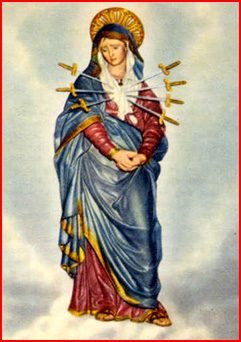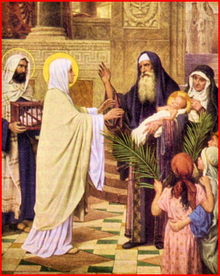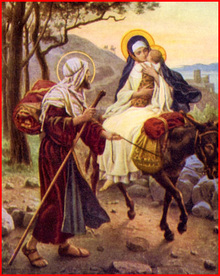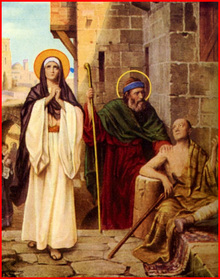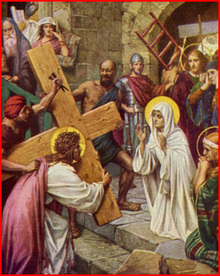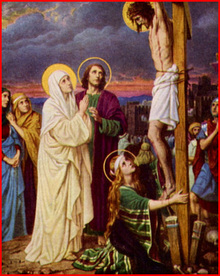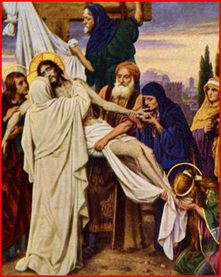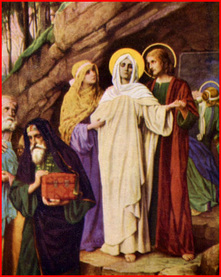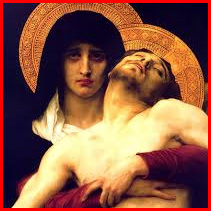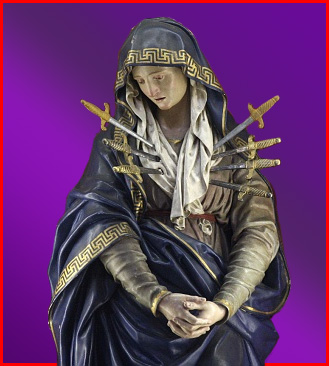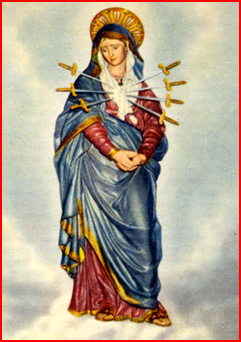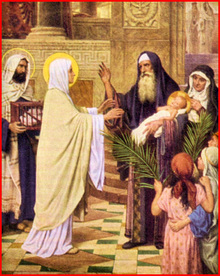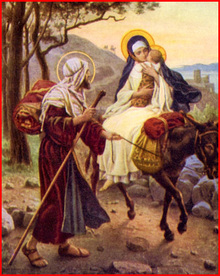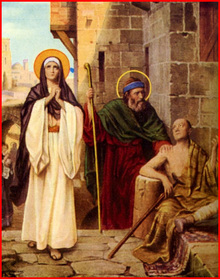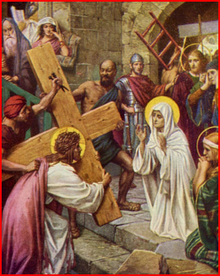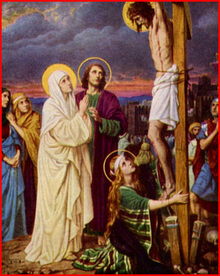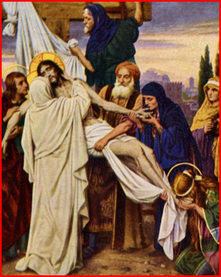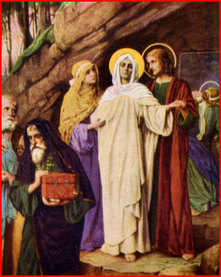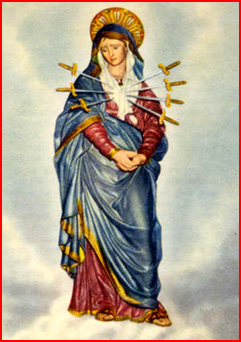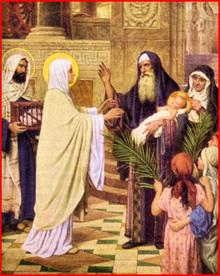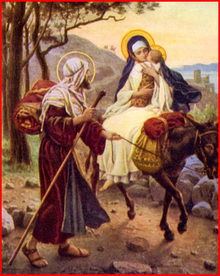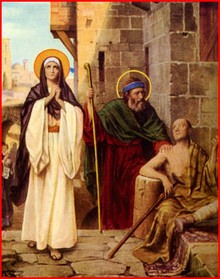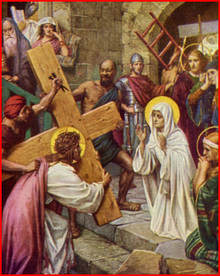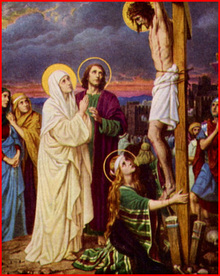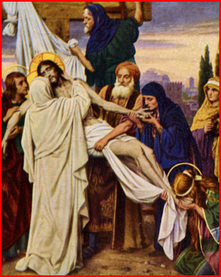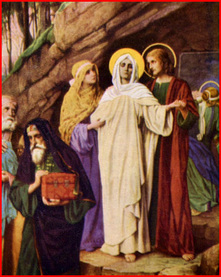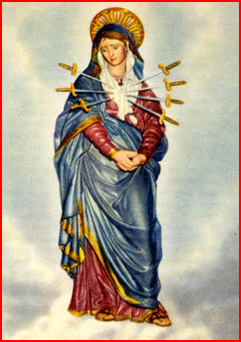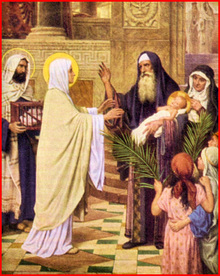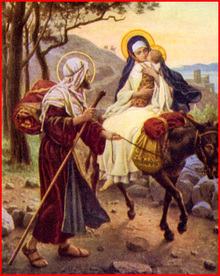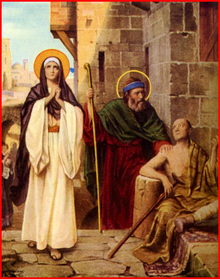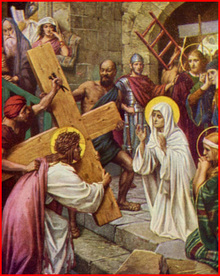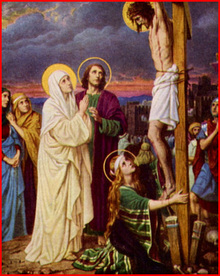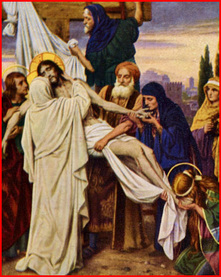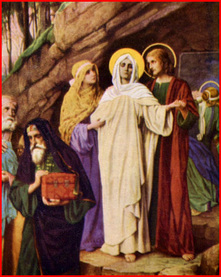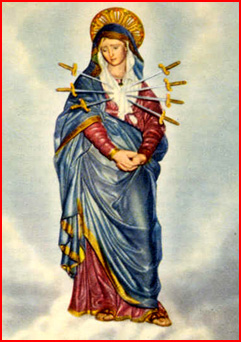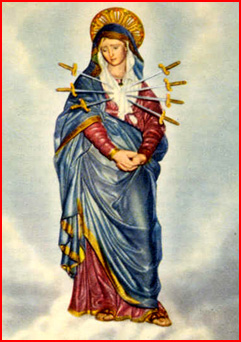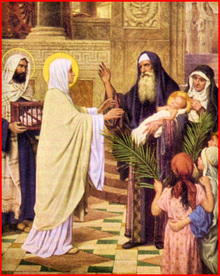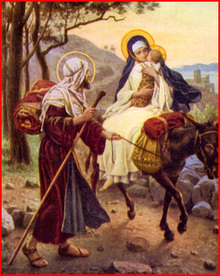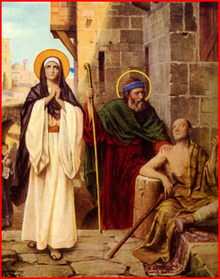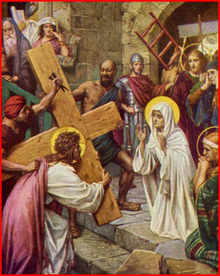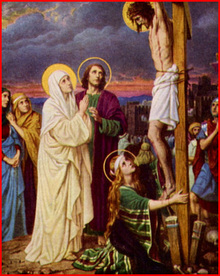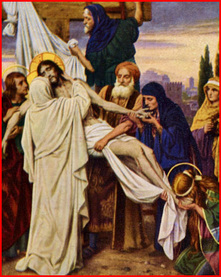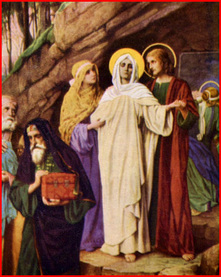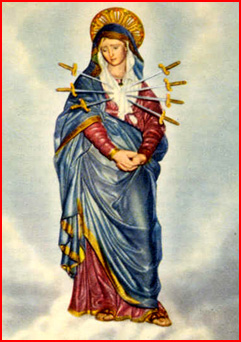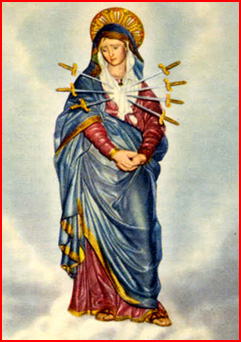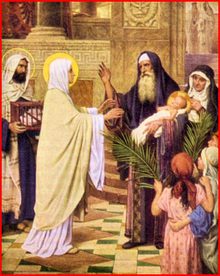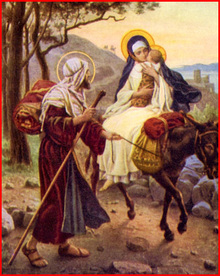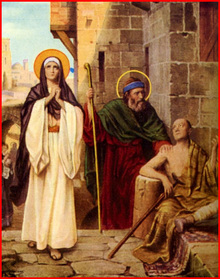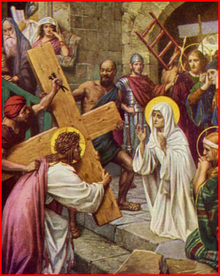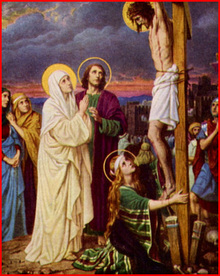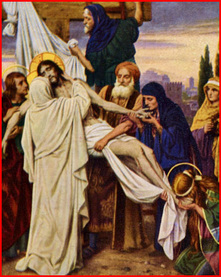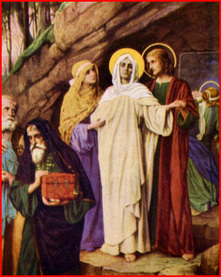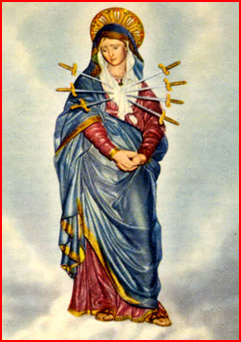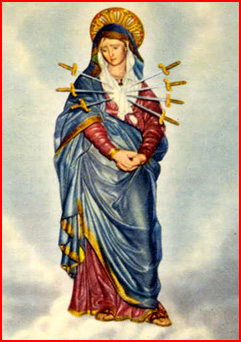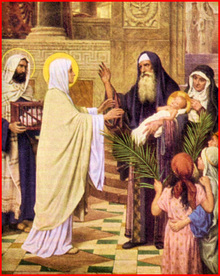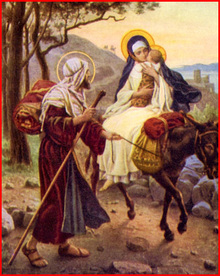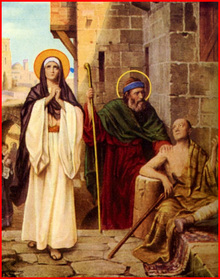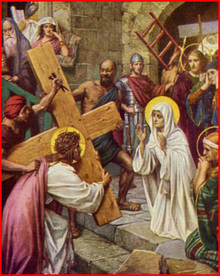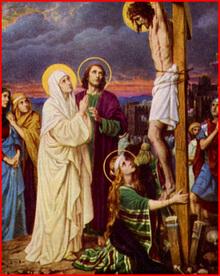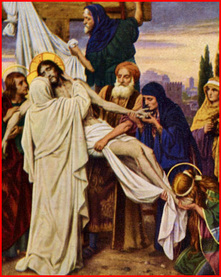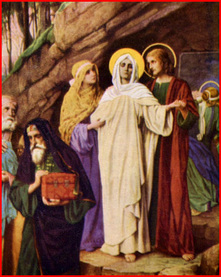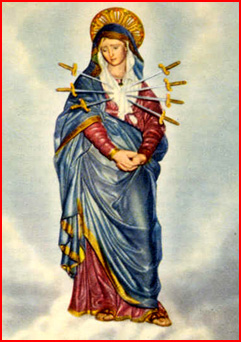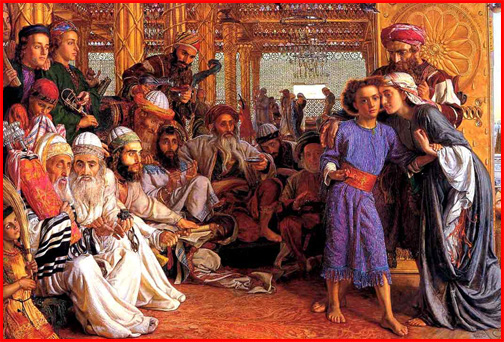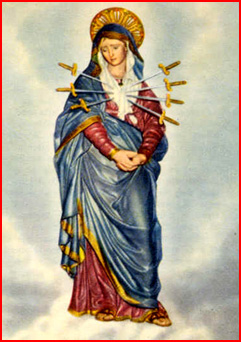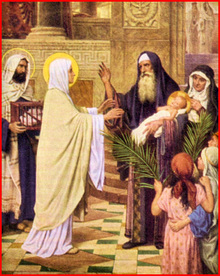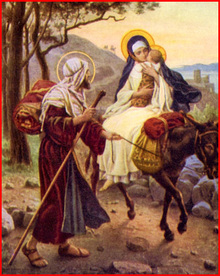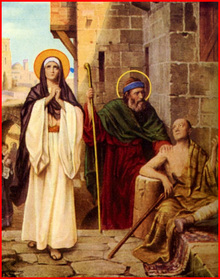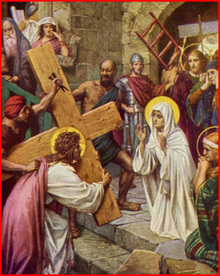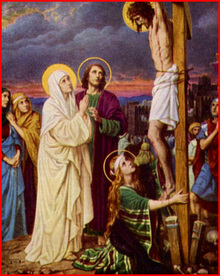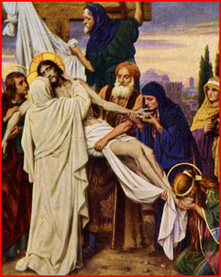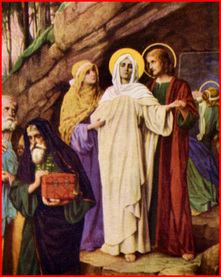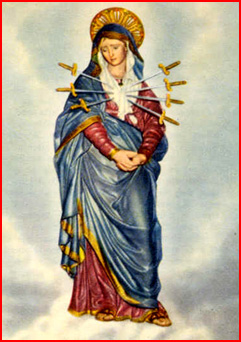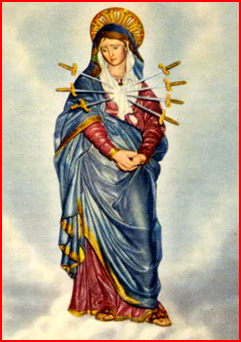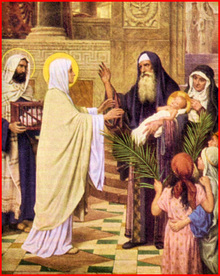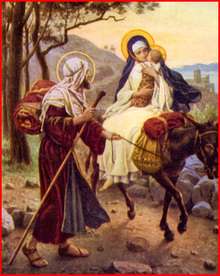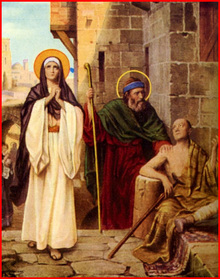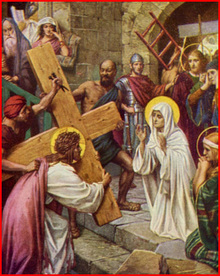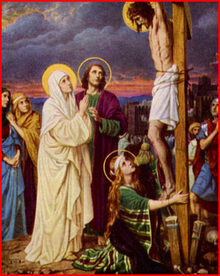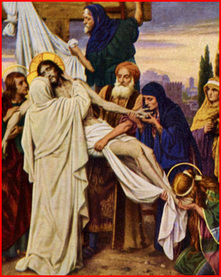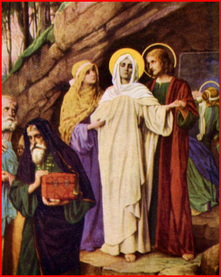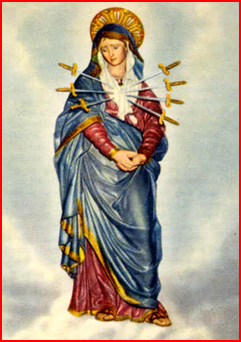| Devotion to Our Lady |
|
- Homepage
-
Daily Thoughts
- 2023 October Daily Thoughts
- Daily Thoughts Lent 2020
- Daily Thoughts for Advent 2019
- Daily Thoughts for October 2019
- Daily Thoughts for September 2019
- Daily Thoughts for August 2019
- Daily Thoughts for July
- Daily Thoughts for June
- Daily Thoughts for Easter 2019
- Daily Thoughts for Lent 2019
- Daily Thoughts for Christmas
- Daily Thoughts Easter 2022
- Sacred Heart
- Consecration
-
Spiritual Life
- Holy Mass Explained
- First Friday Devotions
- First Saturday Devotions
- The Mercy of God
- Vocations
- The Path Everyone Must Walk >
- Gift of Failure
- Halloween or Hell-O-Ween?
- Ignatian Spiritual Exercises >
- Meditation is Soul-Saving
- Spiritual Communion
- Miraculous Medal
- Enrollment in Miraculous Medal
- St. Benedict Medal
- Holy Water
- Advice on Prayer
- Your Daily Mary
-
Prayers
- September Devotions
- Seven Sorrows of Our Lady
-
Novenas
>
- NV-Help of Christians
- NV-Nativity of Our Lady
- NV-Seven Sorrows
- NV- Sorrowful Heart
- NV-Pope St Pius X
- NV-La Salette
- NV-St Michael Archangel
- NV-Immaculate Heart
- NV-Assumption
- NV-Novena for Fathers
- NV-Novena for Your Mother
- NV-St Raphael Archangel
- NV-Souls in Purgatory
- NV-All Saints Day
- NV-Christ the King
- NV-Divine Motherhood
- NV-Guardian Angels
- NV-Rosary
- NV-Mirac Med
- NV- Imm Conc
- NV - Guadalupe
- NV - Nativity of Jesus
- NV-Epiphany
- NV-OL Good Success
- NV-Lourdes
- NV-St Patrick
- NV-St Joseph
- NV-Annunciation
- NV-St Louis de Montfort
- NV-OL Good Counsel
- NV-Last Supper
- NV-Passion
- NV-Pentecost
- NV-Ascension
- NV-Sacred Heart
- NV-Sacred Heart & Perpetual Help
- NV-Corpus Christi
- NV-OL of Perpetual Help
- NV-Queenship BVM
- NV-OL of Mount Carmel
- NV-St Mary Magdalen
- NV- Im Hrt
- August Devotions to IHM
- Immaculate Heart of Mary
- Litany of Dependence
- Prayers to St Mary Magdalen
- Prayers in Times of Sickness Disease & Danger
- Holy Souls in Purgatory
- Meditations on the Litany of Our Lady
- Special Feast Days
- Prayers to Mary (Mon-Sun)
- Litanies to Our Lady >
- Various & Special Needs
- Our Lady of the Rosary
- Our Lady of Mt. Carmel
- Our Lady of Perpetual Help
- Our Lady of Guadalupe
- Other titles of Our Lady
-
Rosary
- Downloads
- Easter Season
-
Holy Week
- Last Seven Words of Jesus >
- Characters of Passion >
- The Last Days of Christ
- Before Palm Sunday
- Palm Sunday
- Monday in Holy Week
- Tuesday in Holy Week
- Wednesday in Holy Week
- Holy Thursday (Last Supper)
- Holy Thursday (Agony & Arrest)
- Night Vigil with Christ
- Good Friday (Pilate & Herod)
- Good Friday (Way of Cross & Crucifixion)
- Saturday in Holy Week
-
Lent
- Ideas for Lent
- Daily Lenten Planner
- Daily Lenten Liturgy
- From Cold to Hot
- Lent with Aquinas
- Lent with Dom Gueranger
- Virtues for Lent
- History of Penance
- How Expensive is Sin?
- Confession of Sins
- Letter to Friends of the Cross
- Sermons for Lent
- Stations of the Cross >
- Lenten Prayers
- 7 Penitential Psalms
- Lenten Psalms SUN
- Lenten Psalms MON
- Lenten Psalms TUE
- Lenten Psalms WED
- Lenten Psalms THU
- Lenten Psalms FRI
- Lenten Psalms SAT
- Lenten Laughs
- Septuagesima
-
Christmas
- Epiphany Explained
- Suggestions for Christmas
- Food For Thought
- Christmas with Aquinas
- Christmas with Dom Gueranger
- Christmas Prayers
- Candles & Candlemas
- Christmas Sermons
- Christmas Prayers SUN
- Christmas Prayers MON
- Christmas Prayers TUE
- Christmas Prayers WED
- Christmas Prayers THU
- Christmas Prayers FRI
- Christmas Prayers SAT
- Twelve Days of Christmas >
-
Advent Journey
- Purgatory
- Christ the King
- Legion of Mary
- Scapular
-
Saints
-
Martyrs for the Faith
>
- Your Daily Martyr >
- All 365 Days of Martyrs
- Cristeros
- St Valentine & Valentine's Day
- Martyrs--Thomas Becket
- Martyrs--John the Apostle
- Holy Machabees
- Age of Martyrdom
- Carmelites of Compiegne
- Martyrs--Peter & Paul
- Martyrs--John the Baptist
- Martyrs--Andrew
- Martyrs--James the Great
- Martyrs--North American
- Martyrs--Seven Holy Sleepers
- Martyrs--Afra
- School of Martyrdom
- Martyrs--Christina
- Desert Saints >
- Saints for Sinners >
- Saints of Mary >
- History of All Saints Day
-
Martyrs for the Faith
>
- Precious Blood
- Holy Ghost
- Synod 2023
-
Catechism
- Catechism Lesson 1
- Catechism Lesson 2
- Catechism Lesson 3
- Catechism Lesson 4
- Catechism Lesson 5
- Catechism Lesson 6
- Catechism Lesson 7
- Catechism Lesson 8
- Catechism Lesson 9
- Catechism Lesson 10
- Catechism Lesson 11
- Catechism Lesson 12
- Catechism Lesson 13
- Catechism Lesson 14
- Catechism Lesson 15
- Catechism Lesson 16
- Catechism Lesson 17
- Catechism Lesson 18
- Catechism Lesson 19
- Catechism Lesson 20
- Catechism Lesson 21
- Catechism Lesson 22
- Bible Study
-
Calendar
- Miracles
- Apparitions
- Shrines
- Prophecies
- Angels Homepage
- Hell
-
Church Crisis
- Conspiracy Theories
- Amazon Synod 2019 >
- Liberalism & Modernism
- Modernism--Encyclical Pascendi
- Modernism & Children
- Modernism--Documents
- The Francis Pages
- Church Enemies on Francis
- Francis Quotes
- Amoris Laetitia Critique
- Danger of Ignorance (Pius X)
- Restore all In Christ (Pius X)
- Catholic Action (Pius X)
- Another TITANIC Disaster?
- The "Errors of Russia"
- CRISIS PRAYERS
- Election Novena 2024
- The Anger Room
- War Zone
- Life of Mary
- Spiritual Gym
- Stupidity
- Coronavirus and Catholicism
- History & Facts
- Books
- Catholic Family
- Children
- Daily Quiz
-
Novena Church & Pope
- Day 01 Church-Pope Novena
- Day 02 Church-Pope Novena
- Day 03 Church-Pope Novena
- Day 04 Church-Pope Novena
- Day 05 Church-Pope Novena
- Day 06 Church-Pope Novena
- Day 07 Church-Pope Novena
- Day 08 Church-Pope Novena
- Day 09 Church-Pope Novena
- Day 10 Church-Pope Novena
- Day 11 Church-Pope Novena
- Day 12 Church-Pope Novena
- Day 13 Church-Pope Novena
- Day 14 Church-Pope Novena
- Day 15 Church-Pope Novena
- Day 16 Church-Pope Novena
- Day 17 Church-Pope Novena
- Day 18 Church-Pope Novena
- Day 19 Church-Pope Novena
- Day 20 Church-Pope Novena
- Day 21 Church-Pope Novena
- Day 22 Church-Pope Novena
- Day 23 Church-Pope Novena
- Day 24 Church-Pope Novena
- Day 25 Church-Pope Novena
- Day 26 Church-Pope Novena
- Day 27 Church-Pope Novena
- Day 28 Church-Pope Novena
- Day 29 Church-Pope Novena
- Day 30 Church-Pope Novena
- Day 31 Church-Pope Novena
- Day 32 Church-Pope Novena
- Day 33 Church-Pope Novena
- Day 34 Church-Pope Novena
- Day 35 Church-Pope Novena
- Day 36 Church-Pope Novena
- Day 37 Church-Pope Novena
- Day 38 Church-Pope Novena
- Day 39 Church-Pope Novena
- Day 40 Church-Pope Novena
- Day 41 Church-Pope Novena
- Day 42 Church-Pope Novena
- Day 43 Church-Pope Novena
- Day 44 Church-Pope Novena
- Day 45 Church-Pope Novena
- Day 46 Church-Pope Novena
- Day 47 Church-Pope Novena
- Day 48 Church-Pope Novena
- Day 49 Church-Pope Novena
- Day 50 Church-Pope Novena
- Day 51 Church-Pope Novena
- Day 52 Church-Pope Novena
- Day 53 Church-Pope Novena
- Day 54 Church-Pope Novena
- Penance Novena
- Daily WeAtheR Forecast
CLICK BELOW FOR THE NOVENA OF YOUR CHOICE (not all links are activated)
| PRAYERS (main page) | NOVENAS (main page) | EPIPHANY OF OUR LORD Jan 6 | OUR LADY OF GOOD SUCCESS Feb 2 | OUR LADY OF LOURDES Feb 11 | | ST. PATRICK Mar 17 | ST. JOSEPH Mar 19 | ANNUNCIATION March 25 | LAST SUPPER | PASSION OF OUR LORD | OUR LADY OF SORROWS Passiontide |
| OUR LADY OF GOOD COUNSEL Apr 26 | ST. LOUIS DE MONTFORT Apr 28 | QUEENSHIP OF MARY May 31 | ASCENSION OF OUR LORD | PENTECOST | | CORPUS CHRISTI | SACRED HEART | SACRED HEART & OUR LADY OF PERPETUAL HELP June 27 | OUR LADY OF PERPETUAL HELP June 27 |
| OUR LADY OF MT. CARMEL July 16 | ST. MARY MAGDALEN Jul 22 | ASSUMPTION Aug 15 | IMMACULATE HEART OF MARY Aug 22 Version 1 |
| IMMACULATE HEART Aug 22 Version 2 | POPE ST. PIUS X Sep 3 | NATIVITY OF OUR LADY Sept 8 | SEVEN SORROWS OF OUR LADY Sept 15 |
| OUR LADY OF LA SALETTE Sept 19 | ST MICHAEL ARCHANGEL Sep 29 | GUARDIAN ANGELS Oct 2 | OUR LADY OF THE ROSARY Oct 7 |
| DIVINE MOTHERHOOD OF OUR LADY Oct 11 | ST. RAPHAEL ARCHANGEL Oct 24 | CHRIST THE KING | ALL SAINTS DAY | SOULS IN PURGATORY | MIRACULOUS MEDAL Nov. 27 | IMMACULATE CONCEPTION Dec 8 | OUR LADY OF GUADALUPE Dec 12 | NATIVITY OF OUR LORD Dec 25 |
| NOVENA FOR MOTHERS | NOVENA FOR FATHERS |
| OTHER TITLES OF OUR LADY |
| PRAYERS (main page) | NOVENAS (main page) | EPIPHANY OF OUR LORD Jan 6 | OUR LADY OF GOOD SUCCESS Feb 2 | OUR LADY OF LOURDES Feb 11 | | ST. PATRICK Mar 17 | ST. JOSEPH Mar 19 | ANNUNCIATION March 25 | LAST SUPPER | PASSION OF OUR LORD | OUR LADY OF SORROWS Passiontide |
| OUR LADY OF GOOD COUNSEL Apr 26 | ST. LOUIS DE MONTFORT Apr 28 | QUEENSHIP OF MARY May 31 | ASCENSION OF OUR LORD | PENTECOST | | CORPUS CHRISTI | SACRED HEART | SACRED HEART & OUR LADY OF PERPETUAL HELP June 27 | OUR LADY OF PERPETUAL HELP June 27 |
| OUR LADY OF MT. CARMEL July 16 | ST. MARY MAGDALEN Jul 22 | ASSUMPTION Aug 15 | IMMACULATE HEART OF MARY Aug 22 Version 1 |
| IMMACULATE HEART Aug 22 Version 2 | POPE ST. PIUS X Sep 3 | NATIVITY OF OUR LADY Sept 8 | SEVEN SORROWS OF OUR LADY Sept 15 |
| OUR LADY OF LA SALETTE Sept 19 | ST MICHAEL ARCHANGEL Sep 29 | GUARDIAN ANGELS Oct 2 | OUR LADY OF THE ROSARY Oct 7 |
| DIVINE MOTHERHOOD OF OUR LADY Oct 11 | ST. RAPHAEL ARCHANGEL Oct 24 | CHRIST THE KING | ALL SAINTS DAY | SOULS IN PURGATORY | MIRACULOUS MEDAL Nov. 27 | IMMACULATE CONCEPTION Dec 8 | OUR LADY OF GUADALUPE Dec 12 | NATIVITY OF OUR LORD Dec 25 |
| NOVENA FOR MOTHERS | NOVENA FOR FATHERS |
| OTHER TITLES OF OUR LADY |
NOVENA HONORING THE SEVEN SORROWS OF OUR LADY
What is a Novena?
A novena is a traditional devotion consisting of specific prayers recited on nine successive days. Besides being a form of praise, a novena is frequently offered for a particular intention. The first novena took place in the Cenacle, during the nine days preceding Pentecost, or the coming of the Holy Ghost. As a regular popular custom, this practice began in 12th century Christianity and continues to be beneficial today as a way of praying for healing, protection or other blessings for ourselves or others.
This particular novena is prayed to God in honor of and thanksgiving for the role Our Lady played in our redemption through her sufferings. Though we speak of the Seven Sorrows of Our Lady, we must not imagine that she only experienced seven sorrows in her entire life! Her whole life was a life of suffering, from which we merely take seven notable sufferings as indicators of that suffering-filled life!
Our Lord revealed to Berthe Petit (1870-1943), the Franciscan Tertiary: "My Mother’s Heart has the right to the title of Sorrowful. I desire that it be set before her title of Immaculate because She herself has won it. Now it is necessary and it is my wish, that this title which is by right My Mother’s should be understood and recognized. This title she earned by her identification with all My sufferings, by her sorrow, her sacrifice, her immolation on Calvary, and indeed for the salvation of mankind. This is the last help which I give before the end of time: the recourse to My Mother under the title which I desire shall be hers throughout the whole world.”
In praying this Novena, as in the case of all prayer, it is good to begin by opening ourselves wholeheartedly to God's will, offering a simple act of trust in God's wisdom and in His providential love for us all, that disposes all things for the ultimate benefit of our souls and their salvation.
How to Pray This Novena
This novena is based on the Seven Sorrows of Our Lady, including extracts from The City of God by the Venerable Mary fo Agreda, which reveal much of what Our Lady underwent throughout these seven painful events. Each day of the novena is divided into the following parts: (1) a look at one of the Seven Sorrows of Our Lady concluded by two general reflections upon Our Lady of Sorrows; (2) if applicable, the actual words spoken by Our Lady to Venerable Mary of Agreda; (3) an occasional quote from Holy Scripture wherever relevant; (4) an occasional quote from a saint or a pope (5) a Meditation; (6) a Prayer; (7) after mentioning your intention, pray the Our Father and the Hail Mary; (8) a Closing Prayer.
A novena is a traditional devotion consisting of specific prayers recited on nine successive days. Besides being a form of praise, a novena is frequently offered for a particular intention. The first novena took place in the Cenacle, during the nine days preceding Pentecost, or the coming of the Holy Ghost. As a regular popular custom, this practice began in 12th century Christianity and continues to be beneficial today as a way of praying for healing, protection or other blessings for ourselves or others.
This particular novena is prayed to God in honor of and thanksgiving for the role Our Lady played in our redemption through her sufferings. Though we speak of the Seven Sorrows of Our Lady, we must not imagine that she only experienced seven sorrows in her entire life! Her whole life was a life of suffering, from which we merely take seven notable sufferings as indicators of that suffering-filled life!
Our Lord revealed to Berthe Petit (1870-1943), the Franciscan Tertiary: "My Mother’s Heart has the right to the title of Sorrowful. I desire that it be set before her title of Immaculate because She herself has won it. Now it is necessary and it is my wish, that this title which is by right My Mother’s should be understood and recognized. This title she earned by her identification with all My sufferings, by her sorrow, her sacrifice, her immolation on Calvary, and indeed for the salvation of mankind. This is the last help which I give before the end of time: the recourse to My Mother under the title which I desire shall be hers throughout the whole world.”
In praying this Novena, as in the case of all prayer, it is good to begin by opening ourselves wholeheartedly to God's will, offering a simple act of trust in God's wisdom and in His providential love for us all, that disposes all things for the ultimate benefit of our souls and their salvation.
How to Pray This Novena
This novena is based on the Seven Sorrows of Our Lady, including extracts from The City of God by the Venerable Mary fo Agreda, which reveal much of what Our Lady underwent throughout these seven painful events. Each day of the novena is divided into the following parts: (1) a look at one of the Seven Sorrows of Our Lady concluded by two general reflections upon Our Lady of Sorrows; (2) if applicable, the actual words spoken by Our Lady to Venerable Mary of Agreda; (3) an occasional quote from Holy Scripture wherever relevant; (4) an occasional quote from a saint or a pope (5) a Meditation; (6) a Prayer; (7) after mentioning your intention, pray the Our Father and the Hail Mary; (8) a Closing Prayer.
ACT OF CONSECRATION TO OUR LADY OF SEVEN SORROWS
Most Sorrowful and Immaculate Heart of Mary, holy Queen of Martyrs and spotless Virgin, would that I could be in Heaven with thee; there to contemplate the honors rendered to thee by the Most Holy Trinity and by the whole Heavenly Court! But since I am still a pilgrim in this valley of tears, receive from me, thy unworthy servant and a poor sinner, the most sincere homage and the most perfect act of vassalage and devotion that a human creature can offer thee.
I consecrate myself to thy Sorrowful and Immaculate Heart, pierced with so many swords of sorrow, and place my poor soul therein forever. Receive me as a partaker in thy Sorrows, and never suffer that I should depart from that Cross on which thy only begotten Son expired for me and which He wishes to share with me. With thee, O Mary, I will endure all the sufferings, persecutions, adversities, failures, contradictions and infirmities, with which it will please thy Divine Son to visit me in this life.
All of them I offer to thee, in memory of the Sorrows which thou didst suffer during thy life, that every thought of my mind, every beating of my heart may henceforward be an act of compassion to thy Sorrows, and of delight for the glory thou now enjoyest in Heaven.
Since then, O Dear Mother, I now meditate thy Sorrows, and rejoice in seeing thee glorified, do thou also have compassion on me, and reconcile me to thy Son Jesus, that I may become thy true and loyal son (daughter); come on my last day and assist me in my last agony at the hour death, even as thou wert present at the Agony of thy Divine Son Jesus, that from this painful exile I may go to Heaven, there to be made partaker of thy glory. Amen.
Now pray and reflect briefly upon the Seven Sorrows of the Blessed Virgin Mary
SHORT DEVOTION ON THE SEVEN SORROWS OF OUR LADY
V. Incline unto my aid, O Lord.
R. O Lord, make haste to help me.
V. Glory Be to the Father, and to the Son and to the Holy Ghost.
R. As is was in the beginning, is now, and ever shall be, world without end. Amen
Our Father....
1. The Prophecy of Simeon
“And Simeon blessed them, and said to Mary His mother: ‘Behold this Child is set for the fall and for the resurrection of many in Israel, and for a sign which shall be contradicted! And thy own soul a sword shall pierce, that out of many hearts thoughts may be revealed!’” (Luke 2:34-35).
BRIEF MEDITATION: How great was the shock to Mary’s Heart at hearing the sorrowful words, with which the holy Simeon foretold the bitter Passion and death of her sweet Jesus, since in that same moment she realized in her mind all the insults, blows, and torments which the impious men were to offer to the Redeemer of the world. But a still sharper sword pierced her soul. It was the thought of men’s ingratitude to her beloved Son. Now consider that, because of your sins, you are unhappily among the ungrateful.
Say one Ave Maria (Hail Mary)
2. The Flight into Egypt
“And after they (the wise men) were departed, behold an angel of the Lord appeared in sleep to Joseph, saying: ‘Arise and take the Child and His Mother and fly into Egypt: and be there until I shall tell thee. For it will come to pass that Herod will seek the Child to destroy Him!’ Who arose and took the Child and His Mother by night, and retired into Egypt: and He was there until the death of Herod.” (Matthew 2:13-14).
BRIEF MEDITATION: Consider the sharp sorrow which Mary felt when, St. Joseph being warned by an angel, she had to flee by night in order to preserve her beloved Child from the slaughter decreed by Herod. What anguish was hers, in leaving Judea, lest she should be overtaken by the soldiers of the cruel king! How great her privations in that long journey! What sufferings she bore in that land of exile, what sorrow amid that people given to idolatry! But consider how often you have renewed that bitter grief of Mary, when your sins have caused her Son to flee from your heart.
Say one Ave Maria (Hail Mary)
3. The Loss of the Child Jesus for Three Days
“And having fulfilled the days, when they returned, the Child Jesus remained in Jerusalem; and His parents knew it not. And thinking that He was in the company, they came a day’s journey, and sought Him among their kinsfolk and acquaintance. And not finding Him, they returned into Jerusalem, seeking Him.” (Luke 2:43-45).
BRIEF MEDITATION: How dread was the grief of Mary, when she saw that she had lost her beloved Son! And as if to increase her sorrow, when she sought Him diligently among her kinsfolk and acquaintance, she could hear no tidings of Him. No hindrances stayed her, nor weariness, nor danger; but she forthwith returned to Jerusalem, and for three long days sought Him sorrowing. Great be your confusion, O my soul, who has so often lost your Jesus by your sins, and has given no heed to seek Him at once, a sign that you make very little or no account of the precious treasure of divine love.
Say one Ave Maria (Hail Mary)
4. The Meeting of Jesus and Mary on the Way of the Cross
“And there followed Him a great multitude of people, and of women, who bewailed and lamented Him.” (Luke 23:27).
BRIEF MEDITATION: Come, O ye sinners, come and see if ye can endure so sad a sight. This Mother, so tender and loving, meets her beloved Son, meets Him amid an impious rabble, who drag Him to a cruel death, wounded, torn by stripes, crowned with thorns, streaming with blood, bearing His heavy cross. Ah, consider, my soul, the grief of the Blessed Virgin thus beholding her Son! Who would not weep at seeing this Mother’s grief? But who has been the cause of such woe? I, it is I, who with my sins have so cruelly wounded the heart of my sorrowing Mother! And yet I am not moved; I am as a stone, when my heart should break because of my ingratitude.
Say one Ave Maria (Hail Mary)
5. The Crucifixion
“They crucified Him ... Now there stood by the cross of Jesus, His Mother. When Jesus therefore had seen His Mother and the disciple standing whom He loved, He saith to His Mother: ‘Woman! Behold thy son!’ After that He saith to the disciple: ‘Behold thy Mother!’” (John 19:18, 25-27).
BRIEF MEDITATION: Look, devout soul, look to Calvary, whereon are raised two altars of sacrifice, one on the Body of Jesus, the other on the Heart of Mary. Sad is the sight of that dear Mother drowned in a sea of woe, seeing her beloved Son, part of her very self, cruelly nailed to the shameful tree of the cross. Ah me! How every blow of the hammer, how every stripe which fell on the Saviour’s form, fell also on the disconsolate spirit of the Virgin. As she stood at the foot of the cross, pierced by the sword of sorrow, she turned her eyes on Him, until she knew that He lived no longer and had resigned His spirit to His Eternal Father. Then her own soul was like to have left the body and joined itself to that of Jesus.
Say one Ave Maria (Hail Mary)
6. The Taking Down of the Body of Jesus from the Cross
“Joseph of Arimathea, a noble counselor, came and went in boldly to Pilate, and begged the body of Jesus. And Joseph buying fine linen, and taking Him down, wrapped Him up in the fine linen.” (Mark 15:43-46).
BRIEF MEDITATION: Consider the most bitter sorrow which rent the soul of Mary, when she saw the dead body of her dear Jesus on her knees, covered with blood, all torn with deep wounds. O mournful Mother, a bundle of myrrh, indeed, is thy Beloved to thee. Who would not pity thee? Whose heart would not be softened, seeing affliction which would move a stone? Behold John not to be comforted, Magdalen and the other Mary in deep affliction, and Nicodemus, who can scarcely bear his sorrow.
Say one Ave Maria (Hail Mary)
7. The Burial of Jesus
“Now there was in the place where He was crucified, a garden; and in the garden a new sepulcher, wherein no man yet had been laid. There, therefore, because of the Parasceve of the Jews, they laid Jesus, because the sepulcher was nigh at hand.” (John 19:41-42).
BRIEF MEDITATION: Consider the sighs which burst from Mary’s sad heart when she saw her beloved Jesus laid within the tomb. What grief was hers when she saw the stone lifted to cover that sacred tomb! She gazed a last time on the lifeless body of her Son, and could scarce detach her eyes from those gaping wounds. And when the great stone was rolled to the door of the sepulcher, oh, then indeed her heart seemed torn from her body!
Say one Ave Maria (Hail Mary)
I consecrate myself to thy Sorrowful and Immaculate Heart, pierced with so many swords of sorrow, and place my poor soul therein forever. Receive me as a partaker in thy Sorrows, and never suffer that I should depart from that Cross on which thy only begotten Son expired for me and which He wishes to share with me. With thee, O Mary, I will endure all the sufferings, persecutions, adversities, failures, contradictions and infirmities, with which it will please thy Divine Son to visit me in this life.
All of them I offer to thee, in memory of the Sorrows which thou didst suffer during thy life, that every thought of my mind, every beating of my heart may henceforward be an act of compassion to thy Sorrows, and of delight for the glory thou now enjoyest in Heaven.
Since then, O Dear Mother, I now meditate thy Sorrows, and rejoice in seeing thee glorified, do thou also have compassion on me, and reconcile me to thy Son Jesus, that I may become thy true and loyal son (daughter); come on my last day and assist me in my last agony at the hour death, even as thou wert present at the Agony of thy Divine Son Jesus, that from this painful exile I may go to Heaven, there to be made partaker of thy glory. Amen.
Now pray and reflect briefly upon the Seven Sorrows of the Blessed Virgin Mary
SHORT DEVOTION ON THE SEVEN SORROWS OF OUR LADY
V. Incline unto my aid, O Lord.
R. O Lord, make haste to help me.
V. Glory Be to the Father, and to the Son and to the Holy Ghost.
R. As is was in the beginning, is now, and ever shall be, world without end. Amen
Our Father....
1. The Prophecy of Simeon
“And Simeon blessed them, and said to Mary His mother: ‘Behold this Child is set for the fall and for the resurrection of many in Israel, and for a sign which shall be contradicted! And thy own soul a sword shall pierce, that out of many hearts thoughts may be revealed!’” (Luke 2:34-35).
BRIEF MEDITATION: How great was the shock to Mary’s Heart at hearing the sorrowful words, with which the holy Simeon foretold the bitter Passion and death of her sweet Jesus, since in that same moment she realized in her mind all the insults, blows, and torments which the impious men were to offer to the Redeemer of the world. But a still sharper sword pierced her soul. It was the thought of men’s ingratitude to her beloved Son. Now consider that, because of your sins, you are unhappily among the ungrateful.
Say one Ave Maria (Hail Mary)
2. The Flight into Egypt
“And after they (the wise men) were departed, behold an angel of the Lord appeared in sleep to Joseph, saying: ‘Arise and take the Child and His Mother and fly into Egypt: and be there until I shall tell thee. For it will come to pass that Herod will seek the Child to destroy Him!’ Who arose and took the Child and His Mother by night, and retired into Egypt: and He was there until the death of Herod.” (Matthew 2:13-14).
BRIEF MEDITATION: Consider the sharp sorrow which Mary felt when, St. Joseph being warned by an angel, she had to flee by night in order to preserve her beloved Child from the slaughter decreed by Herod. What anguish was hers, in leaving Judea, lest she should be overtaken by the soldiers of the cruel king! How great her privations in that long journey! What sufferings she bore in that land of exile, what sorrow amid that people given to idolatry! But consider how often you have renewed that bitter grief of Mary, when your sins have caused her Son to flee from your heart.
Say one Ave Maria (Hail Mary)
3. The Loss of the Child Jesus for Three Days
“And having fulfilled the days, when they returned, the Child Jesus remained in Jerusalem; and His parents knew it not. And thinking that He was in the company, they came a day’s journey, and sought Him among their kinsfolk and acquaintance. And not finding Him, they returned into Jerusalem, seeking Him.” (Luke 2:43-45).
BRIEF MEDITATION: How dread was the grief of Mary, when she saw that she had lost her beloved Son! And as if to increase her sorrow, when she sought Him diligently among her kinsfolk and acquaintance, she could hear no tidings of Him. No hindrances stayed her, nor weariness, nor danger; but she forthwith returned to Jerusalem, and for three long days sought Him sorrowing. Great be your confusion, O my soul, who has so often lost your Jesus by your sins, and has given no heed to seek Him at once, a sign that you make very little or no account of the precious treasure of divine love.
Say one Ave Maria (Hail Mary)
4. The Meeting of Jesus and Mary on the Way of the Cross
“And there followed Him a great multitude of people, and of women, who bewailed and lamented Him.” (Luke 23:27).
BRIEF MEDITATION: Come, O ye sinners, come and see if ye can endure so sad a sight. This Mother, so tender and loving, meets her beloved Son, meets Him amid an impious rabble, who drag Him to a cruel death, wounded, torn by stripes, crowned with thorns, streaming with blood, bearing His heavy cross. Ah, consider, my soul, the grief of the Blessed Virgin thus beholding her Son! Who would not weep at seeing this Mother’s grief? But who has been the cause of such woe? I, it is I, who with my sins have so cruelly wounded the heart of my sorrowing Mother! And yet I am not moved; I am as a stone, when my heart should break because of my ingratitude.
Say one Ave Maria (Hail Mary)
5. The Crucifixion
“They crucified Him ... Now there stood by the cross of Jesus, His Mother. When Jesus therefore had seen His Mother and the disciple standing whom He loved, He saith to His Mother: ‘Woman! Behold thy son!’ After that He saith to the disciple: ‘Behold thy Mother!’” (John 19:18, 25-27).
BRIEF MEDITATION: Look, devout soul, look to Calvary, whereon are raised two altars of sacrifice, one on the Body of Jesus, the other on the Heart of Mary. Sad is the sight of that dear Mother drowned in a sea of woe, seeing her beloved Son, part of her very self, cruelly nailed to the shameful tree of the cross. Ah me! How every blow of the hammer, how every stripe which fell on the Saviour’s form, fell also on the disconsolate spirit of the Virgin. As she stood at the foot of the cross, pierced by the sword of sorrow, she turned her eyes on Him, until she knew that He lived no longer and had resigned His spirit to His Eternal Father. Then her own soul was like to have left the body and joined itself to that of Jesus.
Say one Ave Maria (Hail Mary)
6. The Taking Down of the Body of Jesus from the Cross
“Joseph of Arimathea, a noble counselor, came and went in boldly to Pilate, and begged the body of Jesus. And Joseph buying fine linen, and taking Him down, wrapped Him up in the fine linen.” (Mark 15:43-46).
BRIEF MEDITATION: Consider the most bitter sorrow which rent the soul of Mary, when she saw the dead body of her dear Jesus on her knees, covered with blood, all torn with deep wounds. O mournful Mother, a bundle of myrrh, indeed, is thy Beloved to thee. Who would not pity thee? Whose heart would not be softened, seeing affliction which would move a stone? Behold John not to be comforted, Magdalen and the other Mary in deep affliction, and Nicodemus, who can scarcely bear his sorrow.
Say one Ave Maria (Hail Mary)
7. The Burial of Jesus
“Now there was in the place where He was crucified, a garden; and in the garden a new sepulcher, wherein no man yet had been laid. There, therefore, because of the Parasceve of the Jews, they laid Jesus, because the sepulcher was nigh at hand.” (John 19:41-42).
BRIEF MEDITATION: Consider the sighs which burst from Mary’s sad heart when she saw her beloved Jesus laid within the tomb. What grief was hers when she saw the stone lifted to cover that sacred tomb! She gazed a last time on the lifeless body of her Son, and could scarce detach her eyes from those gaping wounds. And when the great stone was rolled to the door of the sepulcher, oh, then indeed her heart seemed torn from her body!
Say one Ave Maria (Hail Mary)
|
FIRST DAY OF THE NOVENA (new meditations posted each day)
Topic to Contemplate: The 1st Sorrow The Prophecy of Simeon Taken from The City of God by the Venerable Mary of Agreda, Book 2: The Incarnation The eternal Father had decreed, that his Son should be presented to Him in the Temple in mysterious compliance with the Law, of which Christ our Lord was the end (Romans 10:4). This Law was established for no other purpose than that the just men of the Old Testament should perpetually sanctify and offer to the Lord their first-born sons, in the hope that one child thus presented might eventually prove to be the Son of God and a Child of the Mother of the expected Messias (Exodus 13:2). This will of the eternal Father was known to the Mother of the Word; for she saw that all His interior actions were in unison with the will of His eternal Father. Filled with this knowledge, the great Princess passed the night before His Presentation in the Temple in divine colloquies. Speaking to the Father, she said: “My Lord and God most high, Father of My Lord, a festive day for Heaven and earth will be that, in which I shall bring and offer to Thee in Thy holy Temple the living Host. Rich, O my Lord and God, is this oblation; and Thou canst well pour forth, in return for it, Thy mercies upon the human race: pardoning the sinners that have turned from the straight path, consoling the afflicted, helping the needy, enriching the poor, succoring the weak, enlightening the blind, and meeting those who have strayed away. This is, my Lord, what I ask of Thee in offering to Thee thy Only-begotten, who, by Thy merciful condescension is also my Son. If Thou hast given Him to me as a God, I return Him to Thee as God and man; His value is infinite, and what I ask of Thee is much less.” On the next morning, the 'Sun of Heaven' was about to rise up in full view of the world. Our Lady, having provided the turtle-dove and two candles, wrapped Him in swaddling-clothes and took herself, with St. Joseph, from their lodging to the Temple. Having arrived at the Temple-gate, the most Blessed Mother was filled with new and exalted sentiments of devotion. Joining the other women, she bowed and knelt to adore the Lord in spirit and in truth in His holy Temple and she presented herself before the exalted Majesty of God with His Son upon her arms (John 4:23). The holy high-priest Simeon, moved by the Holy Ghost, also entered the temple at that time (Luke 2:27). Approaching the place where the Queen stood with the Infant Jesus in her arms, he saw both Mother and Child enveloped in splendor and glory. The prophetess Anne, who, as the Evangelist says, had come at the same hour, also saw Mary and her Infant surrounded by this wonderful light. In the joy of their spirit both of them approached the Queen of Heaven, and the priest received the Infant Jesus from her arms upon his hands. Raising up his eyes to Heaven he offered Him up to the eternal Father, pronouncing at the same time these words so full of mysteries: “Now dost thou dismiss Thy servant, O Lord, according to Thy Word in peace. Because my eyes have seen Thy salvation, which Thou hast prepared before the face of all peoples: a light for the revelation of the Gentiles, and the glory of Thy people Israel” (Luke 2:29). Mary and Joseph heard this canticle of Simeon, wondering at the exalted revelation it contained. The Evangelist calls them, in this place, the parents of the divine Infant, for such they were in the estimation of the people who were present at this event. Simeon, addressing himself to the most holy Mother of the Infant Jesus, then added: “Behold this Child is set for the fall and for the resurrection of many in Israel, and for a sign which shall be contradicted. And thy own soul a sword shall pierce, that out of many hearts thoughts may be revealed.” Then St. Simeon, being a priest, gave his blessing to the happy parents of the Child. Then also the prophetess Anne acknowledged the incarnate Word, and full of the Holy Ghost, she spoke of the mysteries of the Messias to many, who were expecting the redemption of Israel. By these two holy old people public testimony of the coming of the Redeemer was given to the world. At the moment when the priest Simeon mentioned the sword and the sign of contradiction, which were prophetical of the Passion and Death of the Lord, the Child bowed its head. Thereby, and by many interior acts of obedience, Jesus ratified the prophecy of the priest and accepted it as the sentence of the eternal Father pronounced by His minister. All this the loving Mother noticed and understood; she presently began to feel the sorrow predicted by Simeon and thus in advance was she wounded by the sword, of which she had thus been warned. As in a mirror, her spirit was made to see all the mysteries included in this prophecy; how her most holy Son was to be the stone of stumbling, the perdition of the unbelievers, and the salvation of the faithful; the fall of the synagogue and the establishment of the Church among the heathens; she foresaw the triumph to be gained over the devils and over death, but also that a great price was to be paid for it, namely the frightful agony and death of the Cross (Colossians 2:15). She foresaw the boundless opposition and contradiction, which the Lord Jesus was to sustain both personally and in His Church (John 15:20). At the same time, she also saw the glory and excellence of the predestined souls. Most holy Mary knew it all and in the joy and sorrow of her most pure soul, excited by the prophecies of Simeon and these hidden mysteries, she performed heroic acts of virtue. All these sayings and happenings were indelibly impressed upon her memory; and, of all that she understood and experienced, she forgot not the least iota. At all times she looked upon her most holy Son with such a living sorrow, as we, mere human creatures with hearts so full of ingratitude, shall never be able to feel. The holy spouse St. Joseph was, by these prophecies, also made to see many of the mysteries of the Redemption and of the labors and sufferings of Jesus. But the Lord did not reveal them to him so copiously and openly as they were perceived and understood by his heavenly spouse; for, in him, these revelations were to serve a different purpose, and, besides, St. Joseph was not to be an eye-witness of them during his mortal life. The ceremony of the Presentation thus being over, the great Lady kissed the hand of the priest and again asked his blessing. The same she did also to Anne, her former teacher; for her dignity as Mother of God, the highest possible to angels or men, did not prevent her from these acts of deepest humility. Then, in the company of St. Joseph, her spouse, she returned with the divine Infant to her lodging. They remained for some days in Jerusalem, in order to satisfy their devotion and during that time she spoke a few times with the priest about the mysteries of the Redemption and of the prophecies above mentioned. Although the words of the most prudent Virgin Mother were few, measured and reserved, they were also so weighty and full of wisdom, that they filled the priest with wonder and excited in him the most exalted and the sweetest sentiments of joy in his soul. The same happened also to the prophetess Anne. Both of them died in the Lord shortly afterwards. The Holy Family lodged at the expense of Simeon. During these days the Queen frequented the Temple and in it she was visited with many favors and consolations in recompense for the sorrow caused by the prophecies of the priest. In order to heighten their sweetness, her most holy Son spoke to her on one of these days saying: “My dearest Mother, dry up thy tears and let thy purest heart be expanded; since it is the will of My Father, that I accept the death of the Cross. I desire that Thou be My companion in My labors and sufferings; I long to undergo them for the souls, who are the works of My hands (Ephesians 2:10), made according to My image and likeness, in order to make them partakers of My reign and of eternal life in triumph over My enemies (Colossians 2:15). This is what thou thyself dost wish in union with Me.” The Mother answered: “O my sweetest Love and Son of my womb, if my accompanying Thee shall include not only the privilege of witnessing and pitying Thy sufferings, but also of dying with Thee, so much the greater will be my relief; for it will be a greater suffering for me to live, while seeing Thee die.” In these exercises of love and compassion she passed some days, until St. Joseph was advised to flee into Egypt. INSTRUCTION OF THE VIRGIN MARY TO SISTER MARY OF AGREDA My daughter, the doctrine and example contained in the foregoing chapter will teach thee to strive after the constancy and expansion of heart, by which thou mayest prepare thyself to accept blessings and adversity, the sweet and the bitter with equanimity. O dearest soul! How narrow and unwilling is the human heart toward that which is contrary and distasteful to its earthly inclinations! How it chafes in labors! How impatiently it meets them! How insufferable it deems all that is contrary to its desires! How persistently it forgets, that its Teacher and Master has first accepted sufferings, and has honored and sanctified them in His own Person! It is a great shame, yea a great boldness, on the part of the faithful, that they should abhor suffering, even after my most holy Son did suffer for them and when so many of the just before his Death were led to embrace the cross, solely by the hope that Christ would once suffer upon it, although they would never live to see it. And if this lack of correspondence is so base in others, consider well, my dearest, how vile it would be in thee, who art so anxious to obtain the grace and the friendship of the Most High; who desirest to merit the name of "friend of God", who wishest to belong entirely to Him and that He belong entirely to thee, who wishest to be my disciple and that I be thy Teacher, who aspirest to follow and imitate me, as a faithful daughter imitates her mother (Matthew 7:21). All this must not result in mere sentiment and in empty words, or oft-repeated exclamations of: "Lord! Lord!" and, when the occasion of tasting the chalice and the cross of suffering is at hand, thou must not turn away in sorrow and affliction from the sufferings, by which the sincerity of a loving and affectionate heart is to be tried. All this would be denying by your actions, what you profess by your words, and it would be a swerving from the path of eternal life: for thou canst not follow Christ, if thou refusest to embrace the cross and rejoice in it, nor shalt thou find me by any other way (Matthew 8:34). If creatures fail thee, if temptation or trouble assail thee, if the sorrows of death encompass thee (Psalm 17:5), thou must in no way be disturbed or disheartened; since nothing displeases my most holy Son or me more, than placing a hindrance or misapplying the grace given by Him for thy benefit. By misusing it and receiving it in vain, thou yieldest great victory to the demon, who glories much in having disturbed or subjected any soul that calls itself a disciple of Christ and of me; and having once brought thee to give way in small things, he will soon oppress thee in greater ones. Confide then in the protection of the Most High and press onward trusting in me. Full of this trust, whenever tribulation comes over thee, fervently exclaim: “The Lord is my light and my salvation, whom shall I fear? (Psalm 26, 1). "He is my Helper, why should I hesitate? I have a Mother, a Queen and Mistress, who will assist me and take care of me in my affliction. In this security seek to preserve interior peace and keep forever in thy view my works and my footsteps for thy imitation. Remember the sorrow, which pierced my heart at the prophecies of Simeon, and how I remained in peace and tranquility, without any sign of disturbance, although my heart and soul were transfixed by a sword of pain. In every event I sought motives for glorifying and adoring His admirable wisdom. If the transitory labors and sufferings are accepted with joy and with serenity of heart, they spiritualize the creature, they elevate it and furnish it with a divine insight; by which the soul begins to esteem affliction at its proper value and soon finds consolation and the blessings of mortification and of freedom from disorderly passions. This is the teaching of the school of the Redeemer, hidden from those living in Babylon and from those who love vanity (Matthew 11:25). I wish also that thou imitate me in respecting the priests and ministers of the Lord, who, in the New Law, hold a much higher dignity than in the Old, since the divine Word has now united Itself with human nature and become the eternal High-Priest according to the order of Melchisedech (Psalm 109:4). Listen to their words and instructions, as God requires, whose place they take. Consider the power and authority given them in the Gospels, where it is said: “Who hears you, hears Me; who obeys you obeys Me” (Luke 10:16). Strive after the perfection they teach thee. Ponder and meditate without intermission upon that, which my most holy Son suffered, so that thy soul be a participant in His sorrows. Let the pious memory of His sufferings engender in thee such a disgust and abhorrence of all earthly pleasures, that thou despise and forget all that is visible, and instead, follow the Author of eternal life. Meditation We know that God's thoughts are not our thoughts and that God's way are not our ways (Isaias 55:8). The way in which we love is to try and avert and deflect as many difficulties, pains and sufferings as possible from the ones that we love. God seems to do the opposite! Instead of giving His beloved one sweet things to eat, He gives them bitter foods and bitter herbs instead! Yet, as modern research shows, the bitter foods, on the whole, are more healthy and nutritious than the sweet foods that we would all like. "For whom the Lord loveth, he chastiseth" (Proverbs 3:12). He loved nobody more than His divine Son and His most Holy Mother, and nobody has ever suffered as much as they did. "He spared not even His own Son, but delivered Him up for us all" (Romans 8:32). Our Lady says elsewhere to the Venerable Mary of Agreda, that not one single day of her entire life was found to be without great suffering in one form or another, in body or in soul. For Our Lady, the swords that pierced her Heart were not occasional stab wounds, whereby the sword pierced her and then was withdrawn! No, for her, the swords were permanently in place, continually paining her Sorrowful and Immaculate Heart. Hence, Our Lady complains, as we read above: "How narrow and unwilling is the human heart toward that which is contrary and distasteful to its earthly inclinations! How it chafes in labors! How impatiently it meets them! How insufferable it deems all that is contrary to its desires! How persistently it forgets, that its Teacher and Master has first accepted sufferings, and has honored and sanctified them in His own Person! It is a great shame, yea a great boldness, on the part of the faithful, that they should abhor suffering, even after my most holy Son did suffer for them!" There are two things that we must do: firstly, we must always keep in mind Our Lady's perpetual suffering (like her perpetual virginity) and praise and honor her acceptance and compliance with those sufferings; secondly, we must strive to imitate her attitude to suffering, which is what she requests when she says: "Strive after the constancy and expansion of heart, by which thou mayest prepare thyself to accept blessings and adversity, the sweet and the bitter with equanimity." In this way we look, we learn, and we live in the footsteps of our Sorrowful Mother. This devotion to the Sorrowful Heart of Mary is what Our Lord has insisted upon for these latter days, as He revealed to Berthe Petit (1870-1943), the Franciscan Tertiary: "My Mother’s Heart has the right to the title of Sorrowful. I desire that it be set before her title of Immaculate, because she herself has won it. Now it is necessary and it is My wish, that this title which is by right My Mother’s should be understood and recognized. This title she earned by her identification with all My sufferings, by her sorrow, her sacrifice, her immolation on Calvary, and indeed for the salvation of mankind. This is the last help which I give before the end of time: the recourse to My Mother, under the title which I desire, shall be hers throughout the whole world.” The renowned theologian, Fr. Garrigou-Lagrange, gave approval to the messages communicated through Berthe Petit, writing the following: "I cherish a vivid remembrance of Madamoiselle Berthe Petit, whom I met in Switzerland during the 1914-1918 war. I much appreciated the devotion to the Sorrowful and Immaculate Heart of Mary. I am of the same mind as Cardinals Mercier and Bourne that it recalls what the Blessed Virgin has received from God, both the grace of the Immaculate Conception, as well as what she herself has done and suffered for us." Let us honor her sufferings! Let us learn from her how to suffer! Prayer MARY, MOTHER OF GOD, your sorrows are not merely the sorrows of an earthly mother grieving over the death of an only child. Rather, your sorrows were ordained by God, from all eternity, as part of the penalty to be paid for sin and were to mingle with the sufferings of your Son in that great sacrifice which was to redeem the world. The Gospel speaks of you as standing beneath the cross. This posture is not the one usually describing a mourner who is affected with only human grief. You would have shown your grief as mothers do by sobs and tears. But though your soul was filled with grief, you bravely stood beneath the cross. You did not abandon Jesus as the Apostles did; you remained with Him until He expired. You did not stand at a distance, but drew nearer to the cross—the hard bed on which Jesus had to die. You stood by its side never turning your eyes from Him. You beheld Him suspended by iron nails. You stood there silently fulfilling a part assigned you by Providence. [Mention Intention] MARY, MY MOTHER, you were to complete the offering of your Son, which you had begun on the day of His presentation in the Temple. You presented Him in sacrifice to the Father as your God and the Son of Man, as your offering and the offering of humanity for the redemption of the world. You so loved the world as to give your only Son for our redemption. It was your duty to represent the whole of mankind and to offer those acts of adoration faith, hatred of sin, love and prayer, which were due from those who shared in this sacrifice. At the same time you had to offer the most intense human suffering, in union with the Passion of your Son. You saw in the cross an altar, in your Son a Priest, and in His Blood the price of our Redemption. You suffered in your soul what Jesus suffered in His body, and in union with Him you offered yourself as a victim for our sins. There were two great altars on Calvary; one in the Body of Jesus, the other in your heart; for on that mount, at the same time that your Son sacrificed His body by death, you sacrificed your soul by compassion. What merits did not your perfect immolation gain! Thereby you sanctified all our afflictions and united them with those of Jesus. I can never fully understand the depth of those sorrows that filled your heart as you begot us to the spiritual life, while standing by the cross on Calvary. The words of the prophet are applied to you: “O all you that pass by the way, attend, and see if there be sorrow like unto my sorrow.” Prayer Imprint, O Sorrowful Lady, thy wounds upon my heart, that I may read therein sorrow and love; sorrow, to endure every sorrow for thee; love, to despise every love for thee. Amen. Say the Our Father and the Hail Mary. Final Invocation Most Sorrowful Heart of Mary, pray for us. |
|
SECOND DAY OF THE NOVENA (new meditations posted each day)
Topic to Contemplate: The Flight into Egypt to Escape from King Herod Taken from The City of God by the Venerable Mary of Agreda, Book 2: The Incarnation When the most holy Mary and St. Joseph returned from the Presentation of the Infant Jesus in the Temple, they concluded to stay in Jerusalem for nine days in order to be able, each day, to visit the Temple and repeat the offering of the sacred Victim, their divine Son. On the fifth day, the Deity revealed Itself to her. Speaking to her, He comforted her saying: “Thy wishes and intentions are pleasing in my eyes and I delight in them always. But thou canst not finish the nine days’ devotion, which thou hast begun, for I have in store for thee other exercises of thy love. In order to save the life of thy Son and raise Him up, thou must leave thy home and thy country, flee with Him and thy spouse, Joseph, into Egypt, where thou art to remain until I shall ordain otherwise: for Herod is seeking the life of the Child. The journey is long, most laborious and most fatiguing; do thou suffer it all for my sake; for I am, and always will be, with thee.” Anyone else's Faith and virtue might have been disturbed to see the powerful God fleeing from a miserable earthly being, and that He should do so in order to save His life, as if He, being both God and man, could be affected by the fear of death. But the most prudent and obedient Mother advanced no objection or doubt: she was not in the least disturbed or moved by this order. The Lord referred her to St. Joseph, bidding her to follow his directions in all things concerning the journey. Shedding many tears, she left the temple to go to her lodging-place, without manifesting to her spouse the cause of her sorrow. St. Joseph therefore thought that she grieved on account of the prophecy of Simeon. As the most faithful Joseph loved her so much, and as he was of a kind and solicitous disposition, he was troubled to see his Spouse so tearful and afflicted, and that she should not manifest to him the cause of this new affliction, This disturbance of his soul was one of the reasons why the holy angels spoke to him in sleep, as I have related above, when speaking of the pregnancy of the Queen. For in the same night, while Saint Joseph was asleep, the angel of the Lord appeared to him, and spoke to him as recorded by saint Matthew: “Arise, take the Child and its Mother and flee into Egypt; there shalt thou remain until I shall return to give thee other advice; for Herod is seeking after the Child in order to take away its life.” Immediately the holy spouse arose full of solicitude and sorrow, foreseeing also that of his most loving Spouse. Entering upon her retirement, he said: “My Lady, God wills that we should be afflicted; for his holy angel has announced to me the pleasure and the decree of the Almighty, that we arise and flee with the Child into Egypt, because Herod is seeking to take away its life. Encourage thyself, my Lady, to bear the labors of this journey and tell me what I can do for thy comfort, since I hold my life and being at the service of thy Child and of Thee.” “My husband and my master,” answered the Queen, “if we have received from the hands of the Most High such great blessings of grace, it is meet that we joyfully accept temporal afflictions (Job 2:13). We bear with us the Creator of Heaven and Earth; if He has placed us so near to Him, what arms shall be able to harm us, even if it be the arm of Herod? Wherever we carry with us all our Good, the highest treasure of Heaven, Our Lord, our guide and true light, there can be no desert; but He is our rest, our portion, and our country. Let us proceed to fulfill His will.” Then most holy Mary and Joseph approached the crib where the Infant Jesus lay; and where He, not by chance, slept at that time. Gathering their poor clothing into the casket and loading it on the beast of burden which they had brought from Nazareth, they departed shortly after midnight, and hastened without delay on their journey to Egypt. How foolish it is, or incredulous, to stumble against this cornerstone of Christ, even in His infancy, and to take offense at seeing Him flee to Egypt, in order to defend Himself against Herod; as if this were on account of His weakness and not a mystery, and as if it had happened for no higher purpose than to defend His life against the cruelty of a wicked man. For the well-disposed souls the words of the Evangelist are amply sufficient: since he says it happened in order that the prophecy of Osee might be fulfilled, who prophesies in the name of the eternal Father: “And I called My Son out of Egypt” (Osee 11:1). The ends which He had in view in sending Him there and in calling Him thence are most exalted and mysterious. Our heavenly Pilgrims left Jerusalem and entered upon their banishment into a strange and unknown land. Although faith and hope strengthened them, nevertheless the Lord allowed them to suffer anxiety. Their love for the Infant Jesus would naturally excite in them anxiety and suffering on an occasion like this. They knew not what would happen during such a long journey, nor when it should end, nor how they would fare in Egypt, where they would be entire strangers, nor what comfort or convenience they would find there for raising the Child, nor even how they would be able to ward off great sufferings from Him on the way to Egypt. Therefore the hearts of these holy Parents were filled with many misgivings and anxious thoughts when they parted with so much haste from their lodging-place. St. Elizabeth, having been told by an angel what was happening, immediately dispatched a servant with some gifts consisting in provisions, money and material for clothing the Infant. She foresaw their needs in a strange country and instructed the servant to overtake them with all haste. He met them in Gaza, which lies a little less than twenty hours from Jerusalem, on the river Besor, and on the road from Palestine to Egypt, not far from the Mediterranean Sea. In this town they remained two days, for St. Joseph and the beast of burden, which carried the Queen, were worn out by the fatigue of the journey. From that place they sent back the servant of St. Elizabeth, taking care to caution him not to tell anyone of their whereabouts. Most holy Mary used the presents sent by Elizabeth in entertaining the poor; for she, who was Mother of the poor, could not bear to pass them by unassisted. The most prudent Virgin would not rely on miraculous assistance whenever she could provide for the daily needs by her own diligence and labor; for in these matters she desired to subject herself to the natural order and depend upon her own efforts. During the two days which they spent in that city, the most pure Mary, in order to enrich it with great blessings, performed some wonderful deeds. She freed two sick persons from the danger of death and cured their ailments. She restored to another person, a crippled woman, the use of her limbs. In the souls of many, who met her and conversed with her, she caused divine effects of the knowledge of God and of a change of life. All of them felt themselves moved to praise their Creator. But neither Mary nor Joseph spoke a word about their native country, nor of the destination, or object of their journey; for if this information had been added to the public notice caused by their wonderful actions, the attention of Herod’s agents might have been drawn toward them, and they might have found sufficient inducement to follow them after their departure. On the third day, after our Pilgrims had touched Gaza, they departed from that city for Egypt. Soon leaving the inhabited parts of Palestine, they entered the sandy deserts of Bersabe, which they were obliged to cross for 180 miles, in order to arrive and take their abode in Heliopolis, the present Cairo in Egypt. This journey through the desert consumed a number of days, for the distance they could travel each day was but short, not only on account of the laborious progress over the deep sand, but also on account of the hardships occasioned by the want of shelter. In order to understand how much Mary and Joseph and also the Infant Jesus suffered on their pilgrimage, it must be remembered that the Almighty permitted His Only-begotten, with His most holy Mother and St. Joseph, to suffer the inconveniences and hardships, naturally connected with travel through this desert. And although the heavenly Lady made no complaints, yet she was much afflicted, which was also true of her most faithful husband. For both of them suffered many personal inconveniences and discomforts, while the Mother, in addition thereto, was afflicted still more on account of the sufferings of her Son and of St. Joseph; and the latter was deeply grieved not to be able, by his diligence and care, to ease the hardships of the Child and his spouse. During all this journey of 180 miles through the desert, they had no other night-shelter than the sky and open air; moreover, it was in the time of winter. In the first night on these sandy plains they rested at the foot of a small hill, this being the only protection they could find. The Queen of Heaven with the Child in her arms seated herself on the earth, and, with her husband, she ate some of the food they had brought with them from Gaza. In order to furnish them with some kind of shelter against the open air, however narrow and humble it might be, Joseph formed a sort of tent by means of his cloak and some sticks. On the next day they pursued their journey and their little store of fruit and bread was soon exhausted, so that they began to suffer great want and to feel the hunger. Although Joseph was more deeply concerned, yet both of them felt this privation very much. On one of the first days of their journey they partook of no sustenance until nine o’clock at night, not having any more even of the coarse and poor food, which until then had sustained them in their hardships and labor. As nature demanded some refreshment after the exertion and weariness of travel, and as there was no way of supplying their want by natural means, the heavenly Lady addressed Herself to the Most High for help. In order that the clamors of the sweetest Mother might proceed from yet greater tribulation, the Most High permitted the elements to afflict them more than at other times, in addition to the sufferings caused by their fatigue, destitution and hunger. For there arose a storm of wind and rain, which harassed and blinded them by its fury. This hardship grieved still more the tender-hearted and loving Mother, on account of the delicate Child, which was not yet fifty days old. Although she tried to cover and protect Him as much as possible, yet she could not prevent Him from feeling the inclemency of the weather, so that He shed tears and shivered from the cold in the same manner as other children are wont to do. They were in want of food, and they were destitute of other things, unprovidable by their own mere human effort; but the Lord allowed them to fall into this need, in order that, listening to the acceptable prayers of his Spouse, He might make provision also for this by the hands of the angels. They brought them delicious bread and well-seasoned fruits, and moreover a most delicious drink. It was the same desert in which Elias, fleeing from Jezebel, was comforted by the hearth cake, brought to him by the angel, in order that he might travel to Mount Horeb. Yet neither this bread, nor the bread and meat, which, once before, the ravens had miraculously brought him every morning and evening at the torrent of Carith, nor the manna which fell from Heaven for the Israelites in the desert, nor the quails, which were carried to them by the African winds; none of all these could be compared to the aid and relief which the Lord gave to his Only-begotten and to His Mother and St. Joseph. In this manner our Exiles proceeded on their way to Egypt. Before They came to the place of their abode in Heliopolis, They were conducted by the angels, according to the command of the Most High, in a roundabout way, so that They might pass through many places, where God wished His miracles and blessings to be wrought for the good of the Egyptians. Thus it came that They consumed in this journey more than fifty days; and the distance of their journey from Bethlehem or Jerusalem amounted to more than 600 hundred miles, while by a direct route such long-drawn-out journey would not have been necessary. INSTRUCTION OF THE VIRGIN MARY TO SISTER MARY OF AGREDA My daughter, learn to bear with equanimity and patience the labors and difficulties of mortal life. My most holy Son and I were eminent Masters in the practice of this doctrine. My Son began to teach it from the moment in which He was conceived in my womb. For already then He began to suffer, and as soon as He was born into the world He and I were banished by Herod into a desert, and His sufferings continued until He died on the Cross. Since, therefore, We suffered so much for creatures and for their salvation, I desire thee to imitate Us in this conformity to the Divine Will. Suffer with a magnanimous heart, and labor to increase the possessions of thy Lord and Master, namely, souls, which are so precious in His sight and which He has purchased with His life-blood. Never shouldst thou fly from labors, difficulties, bitterness and sorrows, if by any of them thou canst gain a soul for the Lord, or if thou canst thereby induce it to leave the path of sin and enter the path of life. I wish that thou take as an example the affectionate wonder which the divine light caused in my soul at seeing my most holy Son subject Himself to the inhuman fury of wicked men, such as was shown by Herod, in this occasion of our flight from his wrath, and, afterwards, by the perverse servants of the high priests and magistrates. Since I knew that my most holy Son was the Creator and Preserver of all things, and that this iniquitous king depended for his life and existence entirely upon this very beneficence, I was particularly struck with wonder to see my Son pray and beseech His eternal Father to confer upon Herod, at this very time, enlightenment, help and blessing; to see my Son, who had it so much in his power to punish him, by His prayers prevent the full measure of chastisement which he deserved. Although Herod’s purpose was frustrated, yet this obstinate reprobate was visited with less chastisement than would have been given to him, if my holy Son had not prayed for him. All this, and whatever else is contained in this matchless mercy and kindness of Jesus. This example I place before thee for thy constant imitation, so that thou mayest understand to what extremes thou must be willing to bear and suffer, forgive and love all who offend thee; for neither thou nor other creatures are innocent and without fault, and many are burdened with numerous and oft-repeated sins, by which they have merited all offenses and insults. Now, if persecutions afford thee the advantage of imitating Him, why shouldst thou not esteem them as a great blessing? Why shouldst thou not love those who give thee occasion to practice this highest perfection, why not thank them for this benefit, and hold them not as enemies, but as benefactors, who give thee a chance to obtain what is of so much importance for thy welfare? My daughter, just as those who know the Lord also know how to trust in Him, so those who do not hope in his goodness and immense love have no perfect knowledge of the Majesty of God. On account of the want of faith and hope, this love also is deficient; for we readily place our love in whom we have confidence and whom we esteem. In this error lies the source of all the damage done to mortals; for they have such a low conception of the infinite bounty, which gave them being and which preserves them, that they fail to place full confidence in their God. Failing in this, they also fail in the love due to Him and they divert it toward the creatures. This deceitful error has filled the earth with lovers of the world; has filled it with avarice and concupiscence against the law of the Creator; has made men insane in their desires; for all of them commonly strive after riches and earthly possessions; claiming thereby merely to satisfy their needs, which is only a pretext for hiding their want of interest in higher things. In reality they lie to themselves abominously, since they are seeking the superfluous; not what is really necessary, but what ministers to worldly pride. If men would confine their desires to what is really necessary, it would be unreasonable to put any confidence in creatures instead of placing it in God alone, Who ineffably provides, even for the young ravens with no less solicitude, than if their crowings were prayers sent up to their Creator for help (Proverbs 28:8). Secure in this confidence, I was not alarmed in my exile and prolonged journey. Since I trusted in the Lord, He provided for me in the time of my need. Prayer MARY, MOTHER OF GOD, your life, like that of your Divine Son, was a daily crucifixion and martyrdom. You found the cross very heavy from the very beginning of your own life; and that cross only grew heavier after the birth of the divine Son! God, Who is love and charity, attracted the envy and hatred of men. God, Who is the source of life, attracted murderous intentions form the creatures to whom He had given life. How sorrowful it must have been to love the Man whom many envied and hated! A mother feels in her heart the things that happen to her children. How terrible must have been the pain in thy Heart in witnessing the base ingratitude and hatred of those creatures who should have gratefully loved Him. You were more intimately united with Him than ever through your sacrificial love, since your will was one with His. He was gradually preparing you for your final separation from Him at the foot of the cross. Because you freely consented to become the Mother of God, you experienced mentally all the bitterness of your Son’s sufferings upon earth. At the very beginning of His life, you observed the hatred and jealousy of His enemies who sought bring about His death. Each single event of the sorrowful drama of over thirty years of sufferings was a sword that pierced your motherly heart. [Mention Intention] MARY, MY MOTHER, grant me the courage not to be afraid of being associated with your divine Son, the Man of Sorrows. Obtain for me the humility to be always ready, at a moment's notice, to take the direction that God indicates to me, even though it may mean much hardship and toil. Beg God to give me fortitude and long-suffering to endure trials, no matter how intense or long they may be. Grant me faith and confidence in the guidance and protection of God's Divine Providence. Help me profitably use all the swords of sorrow that God may send to me, in order to pay the debt of my sins and to obtain the salvation of poor sinners, of whom I am one of the greatest! Pray: Imprint, O Sorrowful Lady, thy wounds upon my heart, that I may read therein sorrow and love; sorrow, to endure every sorrow for thee; love, to despise every love for thee. Amen. Say the Our Father and the Hail Mary. Final Invocation: Most Sorrowful Heart of Mary, pray for us. |
|
THIRD DAY OF THE NOVENA (new meditations posted each day)
Topic to Contemplate: The Loss of the Child Jesus for Three Days Taken from The City of God by the Venerable Mary of Agreda, Book 3: The Transfixion The Child Jesus reached the end of His seventh year while in Egypt, which was also the term set by the eternal Wisdom for His mysterious stay in that land. In order that the prophecies might be fulfilled, it was necessary that He return to Nazareth. They reached Nazareth, their home, for the Child was to be called a Nazarene. Some days after they had settled in Nazareth, the time of the year, in which the Jews were obliged to present themselves before the Lord in the Temple of Jerusalem, was at hand. This commandment obliged the Jews to this duty three times each year, as can be seen in Exodus and Deuteronomy. But it obliged only the men, not the women (Exodus 23:17); therefore the women could go or not, according to their devotion; for it was neither commanded nor prohibited to them. Mary and Jospeh conferred with each other as to what they should do in this regard. Joseph much desired the company of Mary and of her most holy Son; for he wished to offer Him anew to the eternal Father in the Temple. Our Lady also was drawn by her piety to worship the Lord in the Temple. They finally arranged, that two times a year Joseph was to go to Jerusalem by himself, while on the third occasion the three of them would go together. The Israelites visited the Temple on the feast of the Tabernacles (Deuteronomy 16:13), the feast of the Weeks, or Pentecost, and the feast of the Unleavened Breads or the Pasch of the preparation. To this latter feast , Jesus, Mary and Joseph went up together. In addition to the days spent walking to Jerusalem and back, the feast itself lasted seven days. The distance between Nazareth and Jerusalem was over ninety-miles. They passed their nights, sometimes in lodging places, sometimes on the open fields. They consumed more time in these journeys than in previous ones; for after they had come back from Egypt, the Child Jesus desired that they journey on foot; and therefore all three, the Son and the parents, made the pilgrimage on foot. And it was necessary to proceed slowly; for already the Child Jesus began to assume hardships in the service of His eternal Father and for our advantage. He refused to make use of His immense power for lessening the difficulties of the journey, but undertook it as a man subject to suffering, and allowed all the natural causes to produce their effects. One of these effects was the fatigue and exhaustion caused by travel. Although, in His first ever journey, Our Lady and Joseph eased His fatigue by sometimes carrying Him in their arms; yet this was but a slight alleviation and, later on, He always made the whole journey on foot. Our Lady did not interfere, since she knew His desire of suffering. During these journeys of the Holy Family, Jesus and Mary performed heroic works of charity for the benefit of souls; they converted many to the knowledge of the Lord, freed them from their sins and justified them, leading them on the way of life eternal. But as it was not yet time for the Teacher of virtue to manifest Himself, all these works were done in secret (John 12:49). This festival of the unleavened Bread lasted seven days, and the more solemn days were the first and the last. On this account our heavenly Pilgrims remained in Jerusalem during the whole week, spending their time in acts of worship and devotion as the rest of the Jews. Having thus spent all the seven days of the feast they started out on their way home to Nazareth. When his parents departed from Jerusalem, the Child Jesus withdrew from them without their knowledge. For this purpose the Lord availed Himself of the separation of the men and women, which had become customary among the pilgrims for reasons of decency, as well as for greater spiritual recollection during their return homeward. The children which accompanied their parents were taken in charge either by the men or the women, since their company with either was a matter of indifference. Thus it happened that Joseph could easily suppose that the Child Jesus had remained with His Mother; with whom He generally remained. The thought that she would go without Him was far from his mind, since she loved and delighted in Him more than any other creature human or angelic. Our Lady did not have so many reasons for supposing that her most holy Son was in the company of Joseph: but the Lord himself so diverted her thoughts by holy and divine contemplations, that she did not notice His absence at first. When afterwards she became aware of her not being accompanied by her beloved Son, she supposed that Joseph had taken Him along and that the Lord accompanied his foster-father for his consolation. Thus assured, Mary and Joseph pursued their home journey for an entire day, as St. Luke tells us. As the pilgrims proceeded onwards they gradually thinned out, each taking his own direction and joining again with his wife or family. Mary and Joseph found themselves at length in the place where they had agreed to meet on the first evening after leaving Jerusalem. It was very near to the gate of the city, that the divine Child turned and hastened back through the streets. Foreseeing in his divine foreknowledge all that was to happen, He offered it up to his eternal Father for the benefit of souls. He asked for alms during these three days in order to ennoble from that time on humble mendicity as the firstborn of holy poverty. He visited the hospitals of the poor, consoling them and giving them the alms which He had received; secretly He restored bodily health to some and spiritual health to many, by enlightening them interiorly and leading them back to the way of salvation. When Our Lady saw that the Child was not with Joseph, and when he found that Jesus was not with His Mother, the two were struck dumb with amazement and surprise for quite a while. Both, governed in their judgment of things by their most profound humility, each felt overwhelmed with self-reproach at their remissness in watching over their most holy Son and thus blamed themselves for His absence; for neither of them had any suspicion of the mysterious manner in which He had been able to escape their vigilance. After a time they recovered somewhat from their astonishment and with deepest sorrow took counsel with each other as to what was to be done (Luke 2:45). Our Lady said to Joseph: “My heart cannot rest, unless we return with all haste to Jerusalem in order to seek my most holy Son.” This they proceeded to do, beginning their search among their relations and friends, of whom, however, none could give them any information or any comfort in their sorrow; on the contrary their answers only increased their anxiety, since none of them had so much as seen their Son since their departure from Jerusalem. The afflicted Mother turned to her holy angels. She asked: “My friends and companions, you well know the cause of my sorrow: in this bitter affliction be my consolation and give me some information concerning my Beloved, so that I may seek and find Him. Give some relief to my wounded heart.” The holy angels were aware that the Lord wished to give His Mother this occasion of great merit, and that it was not yet time to reveal the secret to her, answered by speaking to her words of consolation without manifesting the whereabouts and the doings of their Lord. This evasive answer raised new doubts in Our Lady. The Mother of wisdom then began to discuss within her heart the different possibilities. The first thought which presented itself to Her, was the fear lest King Archelaus, imitating the cruelty of his father Herod, should have obtained notice of the presence of Jesus and have taken Him prisoner. Although she knew from the Holy Scriptures and revelations, and by her conversations with her most holy Son and Teacher, that the time for his Passion and Death had not yet come and that the king would not take away His life, yet she was filled with dread at the thought, that they should have taken Him prisoner and might illtreat Him. In her profoundest humility she also had misgivings, lest perhaps she had in any way displeased Him by her conduct and therefore deserved that He should leave her and take up his abode in the desert with His precursor St. John the Baptist. Thus Our Lady persevered in her tears and groans without cessation or rest, without sleeping or eating anything for three whole days. Although the angels accompanied her in corporeal forms and witnessed her affliction and sorrow, yet they gave her no clue to find her lost Child. On the third day the great Queen resolved to seek Him in the desert where St. John was; for since she saw no indications that Archelaus had taken Him prisoner, She began to believe more firmly, that her most holy Son was with St. John. When she was about to execute her resolve and was on the point of departing for the desert, the holy angels detained her, urging her not to undertake the journey, since the divine Word was not there. She wanted also to go to Bethlehem, in the hope of finding Him; but this the holy angels likewise prevented, telling her that He was not so far off. Although the blessed Mother heard these answers and well perceived that the holy angels knew the whereabouts of the Child Jesus, She was so considerate and reserved in her humility and prudence, that she gave no response, nor asked where she could find Him; for she understood that they withheld this information by command of the Lord. Not all the sorrows suffered by all the martyrs ever reached the height of the sorrows of most holy Mary in this trial; nor will the patience, resignation and tolerance of this Lady ever be equaled, nor can they; for the loss of Jesus was greater to Her than the loss of anything created, while her love and appreciation of Him exceeded all that can be conceived by any other creature. Since she did not know the cause of the loss, her anxiety was beyond all measure. Moreover, during these three days the Lord left her to her natural resources of nature and of grace, deprived of special privileges and favors; for, with the exception of the company and communication of the angels, God suspended all the other consolations and blessings usually granted to her most holy soul. But, O prodigy of holiness, prudence, fortitude and perfection! In such unheard of affliction and sorrow she was not disturbed, nor lost her interior or exterior peace, nor did she entertain a thought of anger or indignation, nor allowed herself any improper movement or expression, nor fell into any excess of grief or annoyance, as is so common in great affliction with other children of Adam, who allow all their passions and faculties to be disarranged, yea even in small difficulties! The Mistress of all virtue held all her powers in heavenly order and harmony; though her sorrow was without comparison great and had pierced her inmost heart, She failed not in reverence and in the praise of the Lord, nor ceased in her prayers and petitions for the human race, and for the finding of her most holy Son. With this heavenly wisdom and with greatest diligence she sought Him for three successive days, roaming through the streets of the city, asking different persons and describing to the daughters of Jerusalem the marks of her Beloved, searching the byways and the open squares of the city. Some of the women asked her what were the distinctive marks of her lost and only Son. One of the women, hearing her description of Him, said: “This Child, with those same marks, came yesterday to my door to ask for alms, and I gave some to Him; and his grace and beauty have ravished my heart. And when I gave Him alms, I felt myself overcome by compassion to see a Child so gracious in poverty and want.” These were the first indications the sorrowful Mother heard of her Only-begotten being in Jerusalem. A little calmed in her sorrow, she pursued her quest and met other persons, who spoke of Him in like manner, Guided by this information she directed her steps to the hospital of the city, thinking that among the afflicted she would find Him among them. Inquiring at that place, she was informed that a Child of that description had paid his visits to the inmates, leaving some alms and speaking words of much consolation to the afflicted. Then the thought struck her, that, since He was not with the poor, He no doubt tarried in the Temple, as in the house of God and of prayer. The holy angels encouraged her to go to the temple. At this moment Joseph again met his Spouse, for, in order to increase their chance of finding the divine Child, they had separated in different directions. By another angel he had now been likewise ordered to proceed to the Temple. During all these three days he had suffered unspeakable sorrow and affliction, hastening from one place to another, sometimes without his heavenly Spouse, sometimes with her. He was in serious danger of losing his life during this time, if the hand of the Lord had not strengthened him and if the most prudent Lady had not consoled him and forced him to take some food and rest. His sincere and exquisite love for the divine Child made him so anxious and solicitous to find Him, that he would have allowed himself no time or care to take nourishment for the support of nature. In the meantime, Jesus had been busy about His Father's business over those three days. Having thus busied Himself with these and other works of his Father, He betook Himself to the temple. On that day it happened that also the rabbis, who were the learned and the teachers of the temple, met in a certain part of the buildings in order to confer among themselves concerning some doubtful points of holy Scriptures. On this occasion the coming of the Messias was discussed. The Child Jesus came to the meeting of these distinguished men, giving them to understand that He had come to hear the discussion and inform Himself on the question treated of whether the Messias was already come, or, if not, concerning the time in which He should come into the world. The opinions of the scribes were much at variance on this question, some of them answering in the affirmative, others in the negative. The teacher of truth, Jesus, foresaw that the discussion would end in error. Jesus stepped forward with serene majesty and with humility presented His arguments in favor of the Messias already having come into the world. The scribes and learned men who heard Him were all dumbfounded. Convinced by his arguments they looked at each other and in great astonishment asked: “What miracle is this? and what prodigy of a boy! Whence has He come and who is the Child?” But though thus astonished, they did not recognize or suspect who it was, that thus taught and enlightened them concerning such an important truth. During this time and before Jesus had finished His argument, His most holy Mother and St. Joseph arrived, just in time to hear Him advance His last arguments. When He had finished, all the teachers of the Law arose with stupendous amazement. Our Lady, absorbed in joy, approached her most loving Son and in the presence of the whole assembly, spoke to Him the words recorded by saint Luke: “Son, why hast Thou done so to us? Behold thy father and I have sought Thee sorrowing" (Luke 4:48). This loving complaint the heavenly Mother uttered with equal reverence and affection, adoring Him as God and manifesting her maternal affliction. The Lord answered: “Why is it that you sought Me? Did you not know that I must be about my Father’s business?” INSTRUCTION OF THE VIRGIN MARY TO SISTER MARY OF AGREDA My daughter, if thou deeply and attentively weigh thy obligations, thou shalt find very easy and sweet all the labors placed upon thee by the commands and precepts of the holy Law of the Lord. This must be the first step of thy pilgrimage, as the beginning and foundation of all Christian perfection. But I have already many times reminded thee, that the fulfillment of the precepts of the Lord must not be cold and lukewarm, but most fervent and devoted. For this will prevent thee from being satisfied with common virtue, and excite thee to undertake works beyond that which God imposes upon thee by command. Remember, dearest, that the journey from the mortal to the eternal life is long, painful and dangerous: long, because it takes up the whole life, it is painful, on account of the hardships, it is dangerous, on account of human frailty and the astuteness of the enemies. In addition to this the time is short, the end uncertain. Since the sin of Adam the animal and earthly life of man is burdensome for all those that subject themselves to it, the chains of the passions are strong, the war against the lower nature continual; sensible pleasures are always present and easily fascinate the faculties of man, while that which is noble, is often hidden from the gaze. All this fills the pilgrimage of life with hazardous dangers and difficulties. Among all these dangers and difficulties not the least are those of the flesh; for its human weakness, always present and always active, withdraws many from grace. The shortest and the most secure course to follow, both for thee and for all men, is to welcome bitterness and sorrow and put aside ease and pleasure of the senses, and inviolably to resolve not to allow them to become dissipated or enjoy greater freedom than the strict rule of reason permits. Do thou also multiply thy deeds of fervor, thy devotions, thy spiritual exercises and in all things increase thy prayers and sacrifices to the eternal Father for the benefit of mortals. Help them also by the example and thy exhortations wherever thou canst. Console the sorrowful, encourage the weak, help the fallen to arise; and for all of them offer, if necessary, thy own lifeblood. Above all strive to please my most holy Son, who suffers so kindly the ingratitude of men, preserving them in existence and continuing to shower his favors upon them. My daughter, by repeated experience, mortals know that they do not lose without sorrow what once they have possessed with delight. This truth, so well established, should convince men what little love they actually have for their God and Creator; since among the many who lose Him, there are so few who heartily grieve at this loss, and thereby show, that they have never really possessed or loved Him with a love flowing from grace. Just as they fail to grieve at losing the highest Good, so they also fail to seek after their God when they have lost Him. I was deprived of the bodily presence of my most holy Son; but, although I was in hope of again finding Him, yet, in my great love, the uncertainty as to the cause of his withdrawal gave me no rest until I found Him. In this I wish that thou, my dearest, imitate me, whether thou lose Him through thy own fault or He removes Himself by the disposition of His own will. So great should be thy dread of losing Him through thy fault, that neither tribulation, nor trouble, nor necessity, nor danger, nor persecution, nor the sword, neither height nor depth should ever withhold thee from seeking after thy God. So strong are the bonds of his love and its chains, that no one can burst them, except thy own free will. The Lord absented Himself from me in order that, seeking Him in sorrow and tears, I might find Him again in joy and with abundant fruits for my soul. I desire that thou imitate me in this mystery and seek Him with such earnestness, as to be consumed with a continual longing without ever in thy whole life coming to any rest until find Him and canst lose Him no more. This anxiety engenders in men a good lifelong fear and abhorrence of sin, by which alone they can be deprived of beatitude, and thus prevents them from being ensnared and misled by the corporeal and visible things of this earth. This anxiety the Creator assists by adding to the natural reasoning powers, faith and hope, which are the spurs of their love toward seeking and finding their last end. Besides these virtues and others infused at Baptism, He sends His inspirations and helps to keep awake the soul in the absence of its Lord and to prevent forgetfulness of Him and of itself while deprived of His amiable presence. Thus it pursues the right course until it finds the great goal, where all its inclinations and longing shall be satiated. Prayer MARY, MOTHER OF GOD, I praise thy humility and hope in searching for thy lost Son! It was through no fault of thine that Jesus absented Himself from thee; but simply to help thee grow in virtue and merit before God by your humble, diligent and persevering search. It was on behalf of us poor sinners that thou didst search for Him; the loss of Whom pierced thy Sorrowful and Immaculate Heart beyond feeble human comprehension. Sin leads to a loss of God! Yet thou art the Refuge of Sinners, who will help sincere penitents find thy Son anew! Have pity and mercy upon us, and, with the same diligence and perseverance with which thou didst seek thy Son, seek out and bring back the poor sinners who have also lost thy Son through the fault of their own sins! [Mention Intention] MARY, MY MOTHER, obtain for me the grace to love my God and thee above all things, thus fulfilling the divine command to love God with all my mind, heart, soul and strength. Yet I cannot love what I do not know; and if I spend so little time in knowing more about God and thee, then little will be my love of God and thee! Thou, who art the Mediatrix of all Grace, grant that I may never place any persons, places or things of this world above God and thee! For the world is an enemy of God and whosoever becomes a friend of the world, becomes an enemy of God. It is true that, by my many sins and frequent lukewarmness, I deserve to lose God and His many blessings and graces that He has showered on me; nevertheless, I know that He desires not the death of a sinner, but that he do penance and live! Thou, art the Refuge of Sinners and the Comforter of the Afflicted, help me turn back from my worldly path and to return to God, seeking Him through worthy fruits of prayer and penance. Pray: Imprint, O Sorrowful Lady, thy wounds upon my heart, that I may read therein sorrow and love; sorrow, to endure every sorrow for thee; love, to despise every love for thee. Amen. Say the Our Father and the Hail Mary. Final Invocation: Most Sorrowful Heart of Mary, pray for us. |
|
FOURTH DAY OF THE NOVENA (new meditations posted each day)
Topic to Contemplate: Meeting Jesus with the Cross Taken from The City of God by the Venerable Mary of Agreda, Book 3: The Transfixion Our Savior proceeded on the way to Calvary bearing upon His shoulders, according to the saying of Isaias, His own government and principality (Isaias 9:6), which was none else than His Cross, from whence He was to subject and govern the world, meriting thereby that His Name should be exalted above all other names and rescuing the human race from the tyrannical power of the demon over the sons of Adam (Colossians 2:15). The same Isaias calls it the yoke and sceptre of the oppressor and executor, who was imperiously exacting the tribute of the first guilt. In order to destroy this tyrant and break the scepter of his reign and the yoke of our servitude, Christ our Savior placed the Cross upon His shoulders; namely, upon that place, where are borne both the yoke of slavery and the sceptre of royal power. He wished to intimate thereby, that He despoiled the demon of this power and transferred it to His own shoulders, in order that thenceforward the captive children of Adam should recognize Him for their legitimate Lord and true King. All mortals were to follow Him in the way of the Cross (Matthew 14:24) and learn, that by this Cross they were subjected to His power (John 12:32) and now become His vassals and servants, bought by His own lifeblood (I Corinthians 4:20). But alas, the pity of our most ungrateful forgetfulness! The fact that the Jews and ministers of the Passion should be ignorant of this mystery hidden to princes of this world, and that they should not dare touch the Cross of the Savior, because they considered it the wood of ignominy and shame, was their own fault and a very great one. Yet their fault is not so great as our own, since its mystery being already revealed to us, we spend our indignation only on the blindness of those who were persecuting Our Lord and God. For, if we blame them for being ignorant of what they ought to have known, how much should we blame ourselves, who, knowing and confessing Christ the Redeemer, persecute and crucify Him by our offenses (Hebrews 6:6)? O my sweetest Love, Jesus, light of my intellect and glory of my soul! Do not, O my Lord, trust in my sluggish torpidity to follow Thee with my Cross on thy way! Take it upon Thee to do me this favor; draw me after Thee, that I may desire contempt and anguish, and seek after participation in Thy ignominy, insults and sorrows. Let this be my portion and my inheritance in this mortal and oppressing life, let this be my glory and my repose; and outside of the Cross and its ignominy, I desire not to live, or be consoled, or to partake of any rest or enjoyment. As the Jews and all of that blind multitude avoided the touch of the Cross of Him, who was so innocently sentenced to die upon it, He opened with it a passage and cleared for Himself a way. His perfidious persecutors looked upon His glorious dishonor as a contagion; and they fled from its approach, though all the rest of the streets were full of shouting and clamoring people, who crowded aside as the herald advanced proclaiming the sentence. The executioners, bare of all human compassion and kindness, dragged our Savior Jesus along with incredible cruelty and insults. Some of them jerked Him forward by the ropes in order to accelerate his passage, while others pulled from behind in order to retard it. On account of this jerking and the weight of the Cross they caused Him to sway to and fro and often to fall to the ground. By the hard knocks He thus received on the rough stones great wounds were opened, especially on the two knees and they were widened at each repeated fall. The heavy Cross also inflicted a wound on the shoulder on which it was carried. The unsteadiness caused the Cross sometimes to knock against His sacred head, and sometimes the head against the Cross; thus the thorns of His crown penetrated deeper and wounded the parts, which they had not yet reached. To these torments of the body the ministers of evil added many insulting words and execrable affronts, ejecting their impure spittle and throwing the dirt of the pavement into His face so mercilessly, that they blinded the eyes that looked upon them with such divine mercy. Thus they of their own account condemned themselves to the loss of the graces, with which His very looks were fraught. By the haste with which they dragged Him along in their eagerness to see Him die, they did not allow Him to catch His breath; for His most innocent body, having been in so few hours overwhelmed with such a storm of torments, was so weakened and bruised, that to all appearances He was ready to yield up life under His pains and sorrows. From the house of Pilate the sorrowful and stricken Mother followed with the multitudes on the way of her divine Son, accompanied by St. John and the pious women. As the surging crowds hindered her from getting very near to the Lord, she asked the eternal Father to be permitted to stand at the foot of the Cross of her blessed Son and see Him die with her own eyes. With the divine consent, she ordered her holy angels to manage things in such a way as to make it possible for her to execute her wishes. The holy angels obeyed her with great reverence; and they speedily led the Queen through some bystreet, in order that she might meet her Son. Thus it came that both of them met face to face in sweetest recognition of each other and in mutual renewal of each other’s interior sorrows. Yet they did not speak to one another, nor would the fierce cruelty of the executioners have permitted such a thing. But the most prudent Mother adored her divine Son and true God, laden with the Cross; and interiorly besought Him, that, since she could not relieve Him of the weight of the Cross and since she was not permitted to command her holy angels to lighten it, He would inspire these ministers of cruelty to procure some one for His assistance. This prayer was heard by the Lord Christ; and so it happened, that Simon of Cyrene was afterwards forced to carry the Cross with the Lord (Matthew 27:32). The Pharisees and the executioners were moved to this measure, some of them out of natural compassion, others for fear lest Christ, the Author of life, should lose His life by exhaustion before it could be taken from Him on the Cross. Beyond all human thought and estimation was the sorrow of the Virgin Mother while she thus witnessed with her own eyes her Son carrying the Cross to Mount Calvary; for she alone could fittingly know and love Him according to His true worth. It would have been impossible for her to live through this ordeal, if the divine power had not strengthened her and preserved her life. With bitterest sorrow she addressed the Lord and spoke to Him in her heart: “My Son and eternal God, light of my eyes and life of my soul, receive, O Lord, the sacrifice of my not being able to relieve Thee of the burden of the Cross and carry it myself, who am a daughter of Adam; for it is I who should die upon it in love of Thee, as Thou now wishest to die in most ardent love of the human race. O most loving Mediator between guilt and justice! How dost Thou cherish mercy in the midst of so great injuries and such heinous offenses! O charity without measure or bounds, which permits such torments and affronts in order to afford it a wider scope for its ardor and efficacy! O infinite and sweetest love, would that the hearts and the wills of men were all mine, so that they could give no such thankless return for all that Thou endurest! O who will speak to the hearts of the mortals to teach them what they owe to Thee, since Thou hast paid so dearly for their salvation from ruin!” As the Evangelist tells us, there were other women among the crowds, who followed the Savior in bitter tears and lamentations (Luke 23:27). The sweetest Jesus turning toward them, addressed them and said: “Daughters of Jerusalem, weep not over Me; but weep for yourselves and for your children. For behold, the days shall come, wherein they shall say: ‘Blessed are the barren, and the wombs that have not borne, and the paps that have not given suck!’ Then shall they begin to say to the mountains: ‘Fall upon us!’ and to the hills: ‘Cover us!’ For if in the green wood they do these things, what shall be done in the dry?” By these mysterious words the Lord acknowledged the tears shed on account of His Passion, and to a certain extent, by showing His appreciation of them, He approved of them. In these women He wished to teach us for what purpose our tears should be shed so that they may attain their end. These compassionate disciples of the Lord were at that time ignorant of the true reason for their tears, since they wept over His sufferings and injuries, and not over the cause of these sufferings; and therefore they merited to be instructed and admonished of the truth. It was as if the Savior had said to them: “Weep over your sins and over the sins of your children, and attribute what I suffer to those sins. I suffer not for my sins, for I am guilty of none and it is not even possible that I be guilty of any. If I approve of your compassion for Me as good and just, much more do I desire you to weep over your sins, for which I suffer, and by this manner of weeping you shall acquire for yourselves and your children the price of My blood and of My Redemption, ignored by this blind people. For there shall come days, namely the days of universal judgment and chastisement, in which those shall be held fortunate, who have not begotten children; and the foreknown shall call upon the mountains and the hills to shield them against My wrath. For if their sins, now only assumed by Me, have such effects on Me, who am innocent, what horrible punishments will they draw upon those, who are so barren and without any fruits of grace and merits?” As a reward for their tears and their compassion these women were enlightened so as to understand this doctrine. In fulfillment of the prayerful wish of the Blessed Mother, the Pharisees and ministers were inspired with the resolve to engage some man to help Jesus our Savior in carrying the Cross to Mount Calvary. At this point, Simon of Cyrene, the father of the disciples Alexander and Rufus (Mark 15:21), happened to come along. He was called by this name because he was a native of Cyrene, a city of Libya, and had come to Jerusalem. This Simon was now forced by the Jews to carry the Cross a part of the way. They themselves would not touch it, yea would not even come near it, as being the instrument of punishment for the One whom they held to be a notorious malefactor. By this pretended caution and avoidance of His Cross they sought to impress the people with a horror for Jesus. The Cyrenean took hold of the Cross and Jesus was made to follow between the two thieves, in order that all might believe Him to be a criminal and malefactor like to them. The Virgin Mother walked very closely behind Jesus, as she had desired and asked from the eternal Father. To His divine will, she so conformed herself in all the labors and torments of her Son, that, witnessing with her own eyes and partaking of all the sufferings of her Son in her blessed soul and in her body, she never allowed any sentiment or wish to arise interiorly or exteriorly, which could be interpreted as regret for the sacrifice she had made in offering her Son for the death of the Cross and its sufferings. Her charity and love of men, and her grace and holiness, were so great, that she vanquished all these movements of her human nature. INSTRUCTION OF THE VIRGIN MARY TO SISTER MARY OF AGREDA I desire that thou become a true disciple of my most holy Son and of myself. The main purpose of the exalted and venerable mysteries, which are made known to thee, and of the teachings, which I so often repeat to thee, is that thou deny and strip thyself, estranging thy heart from all affection to creatures, neither wishing to possess them nor accept them for other uses. By this precaution thou wilt overcome the impediments, which the devils seek to place in the way of the dangerous softness of thy nature. I who know thee, thus advise and lead thee by the way of instruction and correction as thy Mother and Instructress. By the divine teaching thou knowest the mysteries of the Passion and Death of Christ and the one true way of life, which is the Cross; and thou knowest that not all who are called, are chosen. Many there are who wish to follow Christ and very few who truly dispose themselves to imitate Him; for as soon as they feel the sufferings of the Cross they cast it aside. Laborious exertions are very painful and averse to human nature according to the flesh; and the fruits of the spirit are more hidden and few guide themselves by the light. On this account there are so many among mortals, who, forgetful of the eternal truths, seek the flesh and the continual indulgence of its pleasures. They ardently seek honors and fly from injuries: they strive after riches, and contemn poverty; they long after pleasure and dread mortification. All these are enemies of the Cross of Christ (Philippians 3:18), and with dreadful aversion they fly from it, deeming it sheer ignominy, just like those who crucified Christ, the Lord. Another deceit has spread through the world: many imagine that they are following Christ their Master, though they neither suffer affliction nor engage in any exertion or labor. They are content with avoiding boldness in committing sins, and place all their perfection in a certain prudence or hollow self-love, which prevents them from denying anything to their will and from practicing any virtues at the cost of their flesh. They would easily escape this deception, if they would consider that my Son was not only the Redeemer, but their Teacher; and that He left in this world the treasures of His Redemption, not only as a remedy against its eternal ruin, but as a necessary medicine for the sickness of sin in human nature. No one knew so much as my Son and Lord; no one could better understand the quality of love than the divine Lord, who was and is wisdom and charity itself; and no one was more able to fulfill all His wishes (I John 4:16). Nevertheless, although He well could do it, He chose not a life of softness and ease for the flesh, but one full of labors and pains; for He judged His instructions to be incomplete and insufficient to redeem man, if He failed to teach them how to overcome the demon, the flesh and their own self. He wished to inculcate, that this magnificent victory is gained by the Cross, by labors, penances, mortifications and the acceptance of contempt: all of which are the trademarks and evidences of true love and the special watchwords of the predestined. Thou, my daughter, knowest the value of the holy Cross and the honor which it confers upon ignominies and tribulations; do thou embrace the Cross and bear it with joy in imitation of my Son and thy Master (Matthew 16:24). In this mortal life let thy glory be in tribulations, persecutions (Romans 5:3), contempt, infirmities, poverty, humiliation and in whatever is painful and averse to mortal flesh. And in order that in all thy exercises thou mayest imitate me and give me pleasure, I wish that thou seek no rest or consolation in any earthly thing. Thou must not dwell in thy thoughts upon what thou bearest, nor seek to relieve thyself by enlisting the compassion of others. Much less must thou make much of, or try to impress others with the recital of the persecutions, or molestations of creatures, nor should it ever be heard from thy lips, how much thou endurest, nor shouldst thou compare thy sufferings with those of others. Though I do not wish to say, that it is a sin to accept of some reasonable and moderate alleviation, or to mention thy afflictions. However, let this be to thee a general rule: that all human consolation is an imperfection and a danger, and that thou shouldst welcome only that, which the Most High sends to thee Himself or through His holy angels. And even these favors of the divine right hand thou must accept only in so far as they strengthen thee to suffer more constantly and to withdraw thee from all that ministers to the senses. Meditation We naturally experience revulsion at the sight of the Cross! Even Our Lord felt the same way in His Agony in the Graden of Gethsemane. He sweat blood in terror and cried out: "Abba, Father, all things are possible to Thee: remove this chalice from Me ... Father, if Thou wilt, remove this chalice from Me ... My Father, if it be possible, let this chalice pass from Me" (Mark 14:36; Luke 22:42; Matthew 26:39). So the revulsion we feel, when faced by the Cross, is not sinful but natural. However, we must understand why that Cross is there. It is there for several reasons: ► To co-pay for the debt of temporal punishment that we have contracted through choosing to sin. ► To be a medicine and remedy against further future sin, because of the revulsion and pain it inflicts upon us. ► To manifest to God that, by accepting the punishment of the Cross, we admit our guilt of sin. ► To prove our love for God, by accepting pain in return for the pain we have caused Him through sin. Jesus saw all this in His Agony in the Garden, and therefore, out of pity and love for us, despite His revulsion at seeing the Chalice and the Cross He would have to drink and carry, He bravely added the words: "My Father, if this chalice may not pass away, but I must drink it, Thy will be done" (Mark 26:42). That should also be our brave response to each and every Cross that we encounter in our lives. Hard? Of course it's hard! Impossible? No, "With men this is impossible: but with God all things are possible!" (Matthew 19:26) ... "Because no word shall be impossible with God!" (Luke 1:27). Our Lady gave courage and strength to her Son when she met Him on the road to Calvary carrying His Cross; she too will give courage and strength to us as we carry our Cross on the road to Heaven. She is the Mediatrix of all Grace! Prayer MARY, MOTHER OF GOD, I praise thy virtues in sorrowfully witnessing and participating in the sufferings of thy beloved Son and the immense pain that you willed and accepted in cooperating with thy Son in His merciful act of suffering and dying in place of us poor sinners! Never was there a sorrow like unto thy sorrow! A sorrow deepened all the more by the knowledge of thy Son's and thy own innocence in the face of the sinfulness and ingratitude of mankind. In thy innocence, thou didst accept to suffer without complaint, whilst knowing, at the same time, that the guilty sinners would refuse to suffer for their sins and would bitterly complain at the just, but mitigated, punishments that God would inflict upon them, so as to make them necessary partakers and cooperators in the act of Redemption of thy Son. With true sorrow and confusion I humbly and belatedly thank thee, from the depth of my sinful hear,t for both thy example and thy sorrowful cooperation in the Passion of thy Son, so that we, undeserving though we may be, might imitate thee and thus be saved from Hell and granted the opportunity of eternal beatitude in Heaven. [Mention Intention] MARY, MY MOTHER, firstly obtain for me the grace to first of all see and accept the need for the Cross in my life! I have sinned; and through sin I am deserving of death, as Scripture tells us: "The wags of sin is death!" It is the Cross that helps me die to the world and to my own self! Let me ever keep that truth and that necessity before my eyes. Secondly, obtain for me the grace to carry my Cross uncomplainingly, ever mindful of the fact that God never asks what is impossible and if it seems too hard, then God is always ready to give us the extra graces to be able to fulfill His commands and ordinances. Thou art the Mediatrix of all Grace! Grant me the graces that I need to carry my Cross courageously and uncomplainingly as a payment for my many sins. Thirdly, O Mother of Fair Love, obtain for the grace to rise to greater heights, so that, not only do I carry my Cross uncomplainingly, but also lovingly, seeing therein a loving caress of a loving God, of whom Scripture says: "whom the Lord loveth, he chastiseth" (Proverbs 3:12). Lastly, O Mother of the Man of Sorrows, obtain for me the grace to see Jesus in my Cross, for there where is found the Cross, so too is there found Jesus! To hate the Cross is to hate Jesus! To avoid the Cross is to avoid Jesus! To cast-off the Cross is to cast-off Jesus! Grant that I may not cast Him off, but that, no matter how disfigured and unsightly He may be, that I might embrace Him as He embraced the Cross for me! Pray: Imprint, O Sorrowful Lady, thy wounds upon my heart, that I may read therein sorrow and love; sorrow, to endure every sorrow for thee; love, to despise every love for thee. Amen. Say the Our Father and the Hail Mary. Final Invocation: Most Sorrowful Heart of Mary, pray for us. |
|
FIFTH DAY OF THE NOVENA (new meditations posted each day)
Topic to Contemplate: The Death of Jesus on the Cross Taken from The City of God by the Venerable Mary of Agreda, Book 3: The Transfixion Mount Calvary was held to be a place of defilement and ignominy, as being reserved for the chastisement of condemned criminals, whose cadavers spread around it their stench and attached to it a still more evil fame. Our most loving Jesus arrived at its summit so worn out, wounded, torn and disfigured, that He seemed altogether transformed into an object of pain and sorrows. The sorrowful and afflicted Mother, in the bitterness of her soul, also arrived at the summit of the mount and remained very close to her divine Son; but, in the sorrows of her soul, she was as it were beside herself, being entirety transformed by her love and by the pains which she saw Jesus suffer. Near her were St. John and the three Marys; for they alone, through her intercession and the favor of the eternal Father, had obtained the privilege of remaining so constantly near to the Savior and to His Cross. When the most prudent Mother perceived that now the mysteries of the Redemption were to be fulfilled and that the executioners were about to strip Jesus of His clothes for crucifixion, she turned in spirit to the eternal Father and prayed as follows: “My Lord and eternal God, Thou art the Father of Thy Only-begotten Son. I have nursed and sustained; and I love Him with maternal love. As His Mother I have a natural right and Thy Providence will never infringe upon any rights held by Thy creatures. This right of a Mother then, I now yield to Thee and once more place in Thy hands Thy and my Son as a sacrifice for the Redemption of man. Accept, my Lord, this pleasing offering, since this is more than I can ever offer by submitting my own self as a victim to suffering. This sacrifice is greater, not only because my Son is the true God, but because this sacrifice costs me a much greater sorrow and pain. For if the lots were changed and I should be permitted to die, in order to preserve His most holy life, I would consider it a great relief and the fulfillment of my dearest wishes.” The eternal Father received this prayer with ineffable pleasure and complacency. The patriarch Abraham was permitted to go no further than to prefigure and attempt the sacrifice of a son, because the real execution of such a sacrifice God reserved to Himself and to His Only-begotten. Nor was Sara, the mother of Isaac, informed of the intended sacrifice, lest the maternal love of Sara, though she was a just and holy woman, should impel her to prevent the execution of the divine command. But it was not so with Mary, to whom the eternal Father could fearlessly manifest His unchangeable will in order that she might, as far as her powers were concerned, unite with Him in the sacrifice of His Only-begotten. Our Lady saw that the impious ministers were preparing to give to the Lord the drink of wine, myrrh and gall. The Jews were accustomed to give to those about to be executed a drink of strong and aromatic wine in order to raise their vital spirits and to help them to bear their torments with greater fortitude. This custom they now perverted in order to augment the sufferings of the Savior (Proverbs 3:6). The drink, which was intended to assist and strengthen other criminals, by the perfidy of the Jews was now mixed with gall, so that it should have no other effect than to torment His sense of taste by its bitterness. The Blessed Mother was aware of their intentions and asked the Lord not to drink of it. Jesus in deference to the petition of His Mother, without rejecting entirely this new suffering, tasted of the mixture, but would not drink it entirely (Matthew 27:34). It was already the sixth hour, which corresponds to our noontime, and the executioners, intending to crucify the Savior naked, despoiled Him of the seamless tunic and of His garments. As the tunic was large and without opening in front, they pulled it over the head of Jesus without taking off the crown of thorns; but on account of the rudeness with which they proceeded, they inhumanly tore off the crown with the tunic. Thus they opened anew all the wounds of His head, and in some of them remained the thorns, which, in spite of their being so hard and sharp, were wrenched off by the violence with which the executioners despoiled Him of His tunic and, with it, of the crown. With heartless cruelty they again forced it down upon His sacred head, opening up wounds upon wounds. By the rude tearing off of the tunic were renewed also the wounds of His whole body, since the tunic had dried into the open places and its removal was, as David says, adding new pains to His wounds (Psalm 68:27). To all these sufferings was added the confusion of being stripped of His garments in the presence of His most Blessed Mother, of her pious companions, and in full sight of the multitudes gathered around. By His divine power He, however, reserved for Himself the nether garment which His Mother had wound around His loins in Egypt; for neither at the scourging, nor at the crucifixion could the executioners remove it, and He was laid in the sepulcher still covered with this cloth. He desired to die in the greatest poverty and to take with Him nothing of all that He created and possessed in this world. He would gladly have died entirely despoiled and bereft of even this covering, if it had not been for the desires and the prayers of His Blessed Mother, to which Christ wished to yield. The holy Cross was lying on the ground and the executioners were busy making the necessary preparations for crucifying Him and the two thieves. In the meanwhile our Redeemer and Master prayed to the Father in the following terms: “Eternal Father, to Thy infinite goodness and justice, I offer Myself, also my most loving Mother, her love, her most perfect works, her sorrows, her sufferings, her anxious and prudent solicitude in serving Me, imitating Me and accompanying Me unto death. I offer Thee the little flock of my Apostles; the holy Church such as it is now and as it shall be to the end of the world. All this I place in Thy hands. I suffer and die for all, and I desire that all shall be saved, under the condition that all follow Me and profit of my Redemption. Thus may they pass from the slavery of the devil to be Thy children. Especially, O my Lord, do I offer to Thee the poor, the despised and afflicted, who are my friends and who follow Me on the way to the Cross. I beseech Thee, My Father, to withhold Thy chastisement and not to raise the scourge of Thy justice over men; let them not be punished as they merit for their sins. I pray for those who are persecuting Me, in order that they may be converted to the truth.” For Our Lady, neither sorrow could disturb her, nor anguish hinder her, nor persecution detain her, nor the bitterness of her suffering weaken her. If the great Queen had assisted at the Passion with the same sentiments as the rest of the just, it would indeed have been admirable; but not so admirable as the way in which she suffered. She was singular and extraordinary in all her sufferings; for she felt in her own body all the torments of Christ our Lord, both interior and exterior. On account of this conformity we can say, that Our Lady was scourged, crowned, spat upon, buffeted, laden with the Cross and nailed upon it; for she felt these pains and all the rest in her body, although she felt them in a different manner. After the Savior was nailed to the Cross they dragged the lower end of the Cross with the crucified God near to the hole, wherein it was to be planted. Some of them getting under the upper part of the Cross with their shoulders, others pushing upward with their halberds and lances, they raised the Savior on His Cross and fastened its foot in the hole they had drilled into the ground. Thus our true life and salvation now hung in the air upon the sacred wood in full view of the innumerable multitudes of different nations and countries. The sacred body now shed much blood from the nail wounds, which, by its weight and the shock of the Cross falling into the hole, had widened. Then they crucified also the two thieves and planted their crosses to the right and the left of the Savior; for thereby they wished to indicate that He deserved the most conspicuous place as being the greatest malefactor. The Pharisees and priests, forgetting the two thieves, turned all the venom of their fury against the sinless and holy One. Wagging their heads in scorn and mockery they threw stones and dirt at the Cross of the Lord. The two thieves in the beginning also mocked the Lord and said: “If Thou art the Son of God, save Thyself and us.” These blasphemies of the two thieves caused special sorrow to our Lord, since they were so near to death and were losing the fruit of their death pains, by which they could have satisfied in part for their justly punished crimes. Soon after, however, one of them availed himself of the greatest opportunity that a sinner ever had in this world, and was converted from his sins. When Our Lady, perceived that the Jews in their perfidy and obstinate envy vied in dishonoring Him, in blaspheming Him as the most wicked of men and in desiring to blot out His Name from the land of the living, as Jeremias had prophesied (Jeremias 11:19), she was inflamed with a new zeal for the honor of her Son and true God. Prostrate before the person of the Crucified, and adoring Him, she besought the eternal Father to see to the honor of His Only-begotten and manifest it by such evident signs that the perfidy of the Jews might be confounded and their malice frustrated of its intent. In virtue of this prayer, the Lord enlightened and moved the hearts of many of the bystanders, in order that they might confess Jesus crucified as holy, just and as the true Son of God. As the wood of the Cross was the throne of His majesty and the chair of the doctrine of life, and as He was now raised upon it, confirming His doctrine by His example, Christ now uttered those words of highest charity and perfection: “Father, forgive them, for they know not what they do!” (Luke 23:34). One of the two thieves, called Dismas, being assisted by the prayers and intercession of Mary, was interiorly enlightened by the first words on the Cross. Moved by true sorrow and contrition for his sins, and thereupon speaking to Jesus, he said: “Lord, remember me when Thou shalt come into Thy kingdom!” (Luke 23:40). Dismas, the thief, merited to hear the second words of the Savior on the Cross: “Amen, I say to thee, this day shalt thou be with Me in Paradise.” Having thus justified the good thief, Jesus turned His loving gaze upon His afflicted Mother, who, with St. John, was standing at the foot of the Cross. Speaking to both, He first addressed His Mother, saying: “Woman, behold thy son!” and then to the Apostle: “Behold thy Mother!” (John 19:26.) The Lord called her Woman and not Mother, because this name of Mother had in it something of sweetness and consolation, the very pronouncing of which would have been a sensible relief. During His Passion He would admit of no exterior consolation, having renounced for that time all exterior alleviation and comfort. Already the ninth hour of the day was approaching. Our Savior spoke the fourth word from the Cross in a loud and strong voice, so that all the bystanders could hear it: “My God, my God, why hast thou forsaken Me?” (Matthew 27:46). The dereliction of which Christ speaks is from His love of those whom He knew would be lost and the reprobate, which, during His last hour, caused in Him the same anguish as it did during His prayer in the garden. He grieved that His copious and superabundant Redemption, offered for the whole human race, should not be efficacious in the reprobate and that He should find Himself deprived of them in the eternal happiness, for which He had created and redeemed them. As this was to happen in consequence of the decree of His Father’s eternal will, He lovingly and sorrowfully complained of it in the words: “My God, my God, why hast Thou forsaken Me?” that is, in so far as God deprived Him of the salvation of the reprobate. In confirmation of this sorrow the Lord added: “I thirst!” The sufferings of the Lord and His anguish could easily cause a natural thirst. But for Him this was not a time to complain of this natural thirst or to quench it. He was thirsting to see the captive children of Adam make use of the graces, which He merited for them and offered to them, and which so many were abusing. In connection with this same mystery the Savior then pronounced the sixth word: “It is consummated” (John 19:29). Now is consummated this work of my coming from heaven and I have obeyed the command of my eternal Father, who sent Me to suffer and die for the salvation of mankind. Having finished and established the work of Redemption in all its perfection, it was becoming that just as He came forth from the Father to enter mortal life (John 16:8), He should enter into immortal life of the Father through death. Therefore Christ our Savior added the last words uttered by Him: “Father, into thy hands I commend my spirit.” The Lord spoke these words in a loud and strong voice, so that the bystanders heard them. In pronouncing them He raised His eyes to Heaven, as one speaking with the eternal Father, and with the last accent He gave up His spirit and inclined His head. By the divine force of these words Lucifer with all his demons were hurled into the deepest caverns of Hell, there they lay motionless. The invincible Queen and Mistress of all virtues understood these mysteries beyond the understanding of all creatures, as she was the Mother of the Savior and the Coadjutrix of His Passion. In order that she might participate in it to the end, just as she had felt in her own body the other torments of her Son, she now, though remaining alive, felt and suffered the pangs and agony of His death. She did not die in reality; but this was because God miraculously preserved her life, when according to the natural course death should have followed. This miraculous aid was more wonderful than all the other favors she received during the Passion. For this last pain was more intense and penetrating; and all that the martyrs and the men sentenced to death have suffered from the beginning of the world cannot equal what the blessed Mary suffered during the Passion. The great Lady remained at the foot of the Cross until evening, when the sacred body was interred. But in return for this last anguish of death, all that was still of this mortal life in the virginal body of the purest Mother, was more than ever exalted and spiritualized. INSTRUCTION OF THE VIRGIN MARY TO SISTER MARY OF AGREDA My daughter, keep in thy memory Christ crucified, and never forget the sufferings of the Cross and the doctrine taught by Him upon it. Seek with all thy power to imitate Him as far as is becoming thy station and possible to thee by His grace. I wish that, from today on, thou live crucified with Christ and dead to this earthly life (2 Corinthians 5:15). Thy state of life must be for thee a most rigid cross, on which thou must remain crucified, and thou must not widen thy path by seeking for dispensation and weakening interpretation of rules to make it easy and comfortable, but at the same time, insecure and full of imperfections. This is the deception into which many fall, that each one according to his state seeks to find ease in the work commanded by the law of God. They set aside the salvation of their soul in their efforts to buy Heaven very cheaply, or risk losing it by dreading the restrictions and entire subjection necessary to observe rigorously the divine law and its precepts. Hence arises the desire to find explanations and opinions, which smooth the paths and highways of eternal life, without heeding the doctrine of my divine Son, that the path of life is very narrow (Matthew 7:14). They forget that the Lord Himself has walked these narrow paths, in order that no one might imagine he can reach eternal life over paths more spacious and comfortable to the flesh and to the inclinations vitiated by sins. This danger is greater for ecclesiastics and religious, who by their very state must follow the Master and must accommodate themselves to His life of poverty and must choose for this purpose the way of the Cross. Some of them however are apt to seek the dignities attached to the religious state for their temporal advantage, for the increase of their own honor and praise. In order to secure it, they lighten the Cross they have promised to bear, so that they live a carnal life, little restricted and much eased by deceptive dispensations and vain excuses. Thou must live strictly; in such a way that thou canst not stretch thyself in any way, being nailed immovably to the Cross with Christ. Thou must set aside all temporal advantages, for the least point pertaining to the utmost perfection of thy state. Thy right hand, my daughter, must be nailed to the Cross by obedience. Thy left hand thou hast nailed to the Cross by poverty, depriving thee of all right to follow any inclination toward the objects usually coveted by the eyes. Thy feet are nailed to the Cross, in order that all thy steps and movements may be pure, chaste and beautiful. In order that this doctrine may appear to thee sweet, and this path less narrow, contemplate and consider in thy heart the image of my Son and Lord full of blood, torments, sorrows, and at last nailed to the Cross, no part of His sacred body being exempt from wounds and excruciating pains. The Lord and I were most solicitous and compassionate toward all the children of men; for them we suffered and endured such bitter sorrows, in order that they might be encouraged not to refuse less severe sufferings for their own eternal good and in return for so obliging a love. Therefore let mortals show themselves thankful, willingly entering upon the rough and thorny path and accepting the Cross, to bear it after Christ. Thus will they walk upon the direct path toward Heaven and gain an eternal happiness (Matthew 16:24). Prayer MARY, MOTHER OF GOD, I praise thy virtues in sorrowfully witnessing and participating in the sufferings and death of thy beloved Son on the Cross. His death should have brought about thy death, yet God miraculously preserved your life in seeing such a horrendous sight, just as the three children at Fatima were preserved from death in seeing Hell. By my many sins I have deserved Hell many times, yet I have been preserved from Hell as thou wert preserved from death on Calvary. Grant that the death of thy Son and thy unimaginable sorrows be not wasted upon me, but like the Good Thief on the cross, who, like me, had merited Hell many times, I may utter, as I am crucified to the punishment for my sins, his humble words: "We receive the due reward of our deeds" (Luke 23:41). [Mention Intention] MARY, MY MOTHER, obtain for me the grace to see and understand the beauty of the Cross, so that I may say with St. Paul: "God forbid that I should glory in anything except in the Cross of our Lord Jesus Christ; by whom the world is crucified to me, and I to the world" (Galatians 6:14). Secondly, grant that I may never flee the Cross of Jesus, like the devils did, but that I might stand by the Cross of my salvation as thou didst on Calvary. Thirdly, I beg of thee to pray for me as thou didst pray for the Good Thief, and stand by me as I die upon the cross of this painful life, so that I, too, may be with thy Son in Paradise. Amen. Pray: Imprint, O Sorrowful Lady, thy wounds upon my heart, that I may read therein sorrow and love; sorrow, to endure every sorrow for thee; love, to despise every love for thee. Amen. Say the Our Father and the Hail Mary. Final Invocation: Most Sorrowful Heart of Mary, pray for us. |
|
SIXTH DAY OF THE NOVENA (new meditations posted each day)
Topic to Contemplate: Mary Receives the Dead Body of Jesus Taken from The City of God by the Venerable Mary of Agreda, Book 3: The Transfixion The Evangelist St. John tells us that near the Cross stood Mary, the most holy Mother of Jesus, with Mary Cleophas and Mary Magdalen. Although this is said of the time before Jesus expired, it must be understood, that the unconquerable Queen remained also afterwards, always standing beneath the Cross and adoring her dead Jesus and His divinity inseparably united to His sacred body. Amid the floods of sorrow, that penetrated to the inmost recesses of her Heart, the great Lady remained immovably constant in the exercise of ineffable virtues, while contemplating the mysteries of man’s Redemption and the order in which divine Wisdom disposed of all them. The greatest affliction of the Mother of mercy was the traitorous ingratitude, which men, to their own great loss, would show toward this extraordinary blessing, so worthy of eternal thanksgiving. But now she was especially solicitous for the burial of the sacred body of her divine Son and how to find someone to take it down from the Cross. Full of this sorrowful anxiety, keeping her heavenly eyes riveted upon it, she turned to her holy angels around her and spoke to them: “Ministers of the Most High, my friends in tribulation, you know that there is no sorrow like unto my sorrow; tell me then, how shall I take down from the Cross, Him whom my soul loves; how and where shall I give Him honorable burial, since this duty belongs to me as His Mother? Tell me what to do, and assist me!” The holy angels answered: “Our Queen and Mistress, let thy afflicted heart be dilated for what is still to be borne. The all-powerful Lord has hidden His glory and power from mortals, in order to subject Himself to the cruelty of man’s impious malice and has always permitted the course of human laws to be fulfilled. One of them is, that the condemned shall not leave the cross without the consent of the judge. We are ready and able to obey thee, but His will restrains us, because He wishes to justify His cause to the end and to shed the rest of the blood still in Him for the benefit of mankind and in order that He may bind them still more firmly to make a return for His overflowing love. If they do not avail themselves of this blessing as they ought, their punishment shall be deplorable and its severity shall make amends for the long-suffering of God in delaying His vengeance.” This answer of the angels increased the sorrow of the afflicted Mother; for it had not been as yet revealed to her, that her divine Son should be wounded by the lance, and the fear of what should happen to the sacred body renewed her tribulation and anxiety. She soon saw an armed band approaching Calvary; and, in her dread of some new outrage against the deceased Savior, she spoke to St. John and the pious women: “Alas, now shall my affliction reach its utmost and transfix my heart! Is it possible, that the executioners and the Jews are not yet satisfied with having put to death my Son and Lord? Shall they now heap more injury upon his dead body?” It was the evening of the great Sabbath of the Jews, and in order to celebrate it with unburdened minds, they had asked Pilate for permission to shatter the limbs of the three men sentenced, so that, their death being hastened, they might be taken from the crosses and not left on them for the following day. With this intent the company of soldiers, which Mary now saw, had come to Mount Calvary. As they saw that the two thieves still alive, they broke their limbs and so hastened their end. But when they examined Jesus they found Him already dead, and therefore did not break His bones, thus fulfilling the mysterious prophecy in Exodus (12:46), commanding that no bones be broken in the figurative Paschal lamb that was to be eaten for the Pasch. But a soldier, by the name of Longinus, approaching the Cross of Christ, thrust his lance through the side of the Savior. Immediately water and blood flowed from the wound, as St. John, who saw it and who gives testimony of the truth, assures us (John 19:34). This wounding of the lance, which could not be felt by the sacred and dead body of the Lord, was felt by the most Blessed Mother in His stead, and in the same manner as if her own bosom had been pierced. But even this pain was exceeded by the affliction of her most holy soul, in witnessing the cruel laceration of the chest of her dead Son. At the same time, moved by compassion and love and in forgetfulness of her own sorrow, she said to Longinus: “The Almighty look upon thee with eyes of mercy for the pain thou hast caused to my soul!” So far and no farther went her indignation (or more properly, her most merciful meekness), for the instruction of all of us who are ever injured. For to the mind of this sincerest Dove, this injury to the dead Christ weighed most heavily; and the retribution sought by her for the delinquent was one of the greatest blessings, namely that God should look upon him with eyes of mercy and return blessings and gifts of grace for the offense. Thus it also happened; for the Savior, moved by the prayer of His Blessed Mother, ordained that some of the blood and water from His sacred side should drop upon the face of Longinus and restore to him his eyesight, which he had almost lost. At the same time sight was given to his soul, so that he recognized, in the Crucified, his Savior, whom he had so inhumanly mutilated. Through this enlightenment Longinus was converted; weeping over his sins and having washed them in the blood and water of the side of Christ, he openly acknowledged and confessed Him as the true God and Savior of the world. He proclaimed Him as such in the presence of the Jews, confounding by his testimony their perfidy and hardness of heart. The most prudent Queen then perceived the mystery of this lance thrust, namely, that, in this last pouring forth of the blood and water, issued forth the new-born Church, cleansed and washed by the Passion and Death of Jesus, and that from His sacred side, as from the roots, should now spread out through the whole world the fruits of life eternal. She conferred within herself also upon the mystery of that rock, struck by the rod of divine justice (Exodus 17:6), in order that the living waters might issue forth, quenching the thirst of all the human race and recreating and refreshing all who betook themselves to drink there from. She considered the coincidence of the five fountains from the wounds of His hands, feet and sides, which opened up the new paradise of the most holy humanity of our Savior, and which were more copious and powerful to fertilize the earth, than those of the terrestrial paradise which divided into four streams over the surface of the globe (Genesis 2:10). These and other mysteries the great Lady combined into a canticle of praise, which she composed in honor of her divine Son after His being wounded by the lance. Together with this canticle, she poured forth a most fervent prayer, that all these mysteries of the Redemption be verified in the blessings spread over the whole human race. The evening of that day of the Parasceve was already approaching, and the loving Mother had as yet no solution of the difficulty of the burial of her dead Son, which she desired so much; but the Lord ordained, that the tribulations of His tenderest Mother should be relieved by Joseph of Arimathea and Nicodemus, whom He had inspired with the thought of caring for the burial of their Master. They were both just men and disciples of the Lord, although not of the seventy-two; for they had not as yet openly confessed themselves as disciples, because of their fear of the Jews, who suspected and hated, as enemies, all those that followed Christ and acknowledged Him as Teacher. The dispositions of divine Providence, concerning the burial of her Son, had not been made known to the most prudent Virgin and, thus, her painful anxiety increased to such an extent, that she saw no way out of the difficulty. In her affliction she raised her eyes to Heaven and implored the aid of God. This prayer the loving Mother offered up after the sacred body of the Lord was perforated by the lance. Soon after, she saw another group of men coming toward Calvary, with ladders and other apparatus, seemingly for the purpose of taking from the Cross her priceless Treasure; but, as she did not know their intentions, she was tortured by new fears of the cruelty of the Jews, and turning to St. John, she said: “My Son, what may be the object of these people in coming with all these instruments?” The apostle answered: “Do not fear them that are coming, my Lady; for they are Joseph and Nicodemus with some of their servants, all of them friends and servants of thy divine Son and my Lord.” Joseph was just in the eyes of the Most High, a noble decurion in the employment of the government, a member of the council, who as is given us to understand in the Gospel, had not consented to the resolves and the proceedings of the murderers of Christ, and who had recognized Jesus as the true Messias. Although Joseph had been a secret disciple of the Lord, yet at His death, in consequence of the efficacious influence of the Redemption, he openly confessed his adherence. Setting aside all fear of the envy of the Jews and caring nothing for the power of the Romans, he went boldly to Pilate and asked for the body of Jesus, in order to take Him down from the Cross and give Him honorable burial. He openly maintained that He was innocent and the true Son of God, as witnessed by the miracles of His life and death. Pilate dared not refuse the request of Joseph, but gave him full permission to dispose of the dead body of Jesus as he thought fit. With this permission Joseph left the house of the judge and called upon Nicodemus. He too was a just man, learned in divine and human letters and in the Holy Scriptures, as is evident in what St. John related of him when he visited Christ at night, in order to hear the doctrine of Jesus Christ (John 3:2). Joseph provided the winding sheets and burial cloths for the body of Jesus, while Nicodemus bought about one hundred pounds of the spices, which the Jews were accustomed to use in the burial of distinguished men (Matthew 27:59). Provided with these and with other necessaries they took their way to Calvary. They were accompanied by their servants and some other pious and devout persons, in whom, likewise, the blood shed for all, by the crucified God, had produced its salutary effects. They approached most Holy Mary, who, in the company of St. John and the holy women, stood in inconceivable sorrow at the foot of the Cross. Instead of a salute, their sorrow at the sight of so painful a spectacle as that of the divine Crucified, was roused to such vehemence and bitterness, that Joseph and Nicodemus remained for a time prostrate at the feet of the Queen and all of them at the foot of the Cross without speaking a word. All of them wept and sighed most bitterly until the invincible Queen raised them from the ground and animated and consoled them; whereupon they saluted her in humble compassion. The most observant Mother thanked them kindly, especially for the service they were about to render to their God and Savior, and promised them the reward in the name of Him, whose body they were to lay in the tomb. Joseph of Arimathea answered: “Even now, our Lady, do we feel in the secret of our hearts the sweet delight of the divine Spirit, who has moved us to such love, that we never could merit it or succeed in explaining it.” Then they divested themselves of their mantles and with their own hands Joseph and Nicodemus placed the ladders to the holy Cross. On these they ascended in order to detach the sacred body, while the glorious Mother stood closely by leaning on the arms of St. John and Mary Magdalen. It seemed to Joseph, that the sorrow of the heavenly Lady would be renewed, when the sacred body should be lowered and she would touch it, and therefore he advised the Apostle to take her aside in order to draw away her attention. But St. John, who knew better the invincible heart of the Queen, answered that from the beginning she had stood by to witness the torments of the Lord and that she would not leave him whom she venerated as her God and loved as the Son of her Womb. Nevertheless they continued to urge the expediency of her retiring for a short time, until they should lower their Master from the Cross. But the great Lady responded: “My dearest masters, since I was present, when my sweetest Son was nailed to the Cross, fear not to allow me to be present at his taking down; for this act of piety, though it shall affect my heart with new sorrow, will, in its very performance, afford a great relief.” Thereupon they began to arrange for the taking down of the body. First they detached the crown from the head, laying bare the lacerations and deep wounds it had caused. They handed it down with great reverence and amid abundant tears, placing it in the hands of the sweetest Mother. She received it prostrate on her knees, in deepest adoration bathed it with her tears, permitting the sharp thorns to wound her virginal countenance in pressing it to her face. She asked the eternal Father to inspire due veneration toward the sacred thorns in those Christians, who should obtain possession of them in future times. In imitation of the Mother, St. John with the pious women and the other faithful there present, also adored it; and this they also did with the nails, handing them first to most holy Mary for veneration and afterward showing their own reverence. Then the great Lady placed herself on her knees and held the unfolded cloth in her outstretched arms ready to receive the dead body of her Son. In order to assist Joseph and Nicodemus, St. John supported the head, and Mary Magdalen the feet, of Christ and thus they tearfully and reverently placed Him into the arms of his sweetest Mother. This was to her an event of mixed sorrow and consolation; for in seeing Him thus wounded and all His beauty disfigured beyond all children of men, the sorrows of her most chaste heart were again renewed; and in holding Him in her arms and at her breast, her incomparable sorrow was rejoiced and her love satiated by the possession of her Treasure. She looked upon Him with supreme worship and reverence, shedding tears of blood. In union with her, as He rested in her arms, all the multitude of her attendant angels worshiped Him, although unseen by all others except Mary. Then St. John first, and after him all those present in their turn, adored the sacred Body. The most prudent Mother, seated on the ground, in the meanwhile held Him in her arms in order that they might satisfy their devotion. In all these proceedings our great Queen acted with such heavenly wisdom and prudence, that she excited the admiration of the angels and men; for all her words were full of the deepest significance, the most winning affection and compassion for her deceased Son, full of tenderness in her lamenting, and full of mystery in sentiment and meaning. Her sorrow exceeded all that could ever be felt by mortals. She moved the hearts to compassion and tears. She enlightened all in the understanding of the sacrament now transpiring under their hands. Above all, without failing in the least of her duties, she preserved her humble dignity and serenity of countenance in the midst of her heartrending affliction. With uniform adaptation to the circumstances she spoke to her beloved Son, to the eternal Father, to the angels, to the bystanders, and to the whole human race, for whose Redemption the Lord had undergone His Passion and Death. INSTRUCTION OF THE VIRGIN MARY TO SISTER MARY OF AGREDA My daughter, the lance thrust which my blessed Son received in His side, was cruel and very painful only to me; but its effects and mysteries are most sweet to those souls who know how to taste its sweetness. It was a great affliction to me; but, whoever meets with this mysterious favor, will find it a great relief and consolation in his sorrows. In order that thou mayest understand this and participate in it, thou must know, that my Son and Lord, on account of His most ardent love for men, in addition to the wounds of the feet and hands, wished to open the wound of His heart, the seat of love, in order that through this port the souls might enter and there receive refuge and relief. This is the only retreat which I wish thee to seek during the time of thy banishment, and which thou must consider as thy habitation upon earth. There thou wilt find the conditions and laws of love for imitating me and learn how, for injuries, thou must return blessings to all who commit them against thee and thine, just as thou hast seen me do, when I was grieved by the wounding of the side of my dead Son. I assure thee, my dearest, that thou canst not do anything more adapted to the obtaining of the efficacious graces from the Almighty. The prayer, which thou offerest in a forgiving spirit, is powerful not only for thy own good, but for the good of the one that offends thee; for the kind heart of my Son is easily moved, when He sees that creatures imitate Him in pardoning offenders and in praying for them; for they thereby participate in His most ardent charity manifested on the Cross. Write this doctrine in thy heart and in imitation of me practice this virtue, of which I thought so highly. Through this wound look upon the heart of Christ thy Spouse and upon me, sweetly and ardently loving in it thy enemies and all creatures. Meditation Our Lady gave to the world a living God, a God made man! The world gives back to Our Lady a dead man who is God! How often don't we destroy the gifts of God! So many graces and inspirations God has sent our way; and, for our part, we kill them and bury them. We prefer our way to God's way—as if we knew better! Throughout most of the Passion of His Son, God's ways (from a merely human point of view) could be said to be shocking! Who on earth would treat their only son, especially a good and innocent son, in the way God treated His own Son? Who would 'torture' a lady in way God seemed to 'torture' Our Lady? Truly His thoughts are not our thoughts, not our ways His ways. "For my thoughts are not your thoughts: nor your ways my ways, saith the Lord" (Isaias 55:8). Which is the best way? God's way, of course! We may think He is rather narrow-minded, but narrow is the path and gate to leads to Heaven. It's his way or the highway—or rather the broad way to Hell: "Enter ye in at the narrow gate: for wide is the gate, and broad is the way that leadeth to destruction, and many there are who go in thereat" (Matthew 7:13). "Strive to enter by the narrow gate; for many, I say to you, shall seek to enter, and shall not be able" (Luke 13:24). Narrow evokes the idea of humility, pain and suffering. Narrow paths can be difficult to negotiate; they don't allow for very much to be brought along and to be carried along them, they seem to demand only the bare minimum. The same can be said for a narrow room; it can be uncomfortable and does not allow much by way of furnishings. Narrow shoes can give pain. Coronary artery disease is a narrowing and hardening of the arteries. The most common symptom of coronary artery disease is angina, or chest pain. This reminds us of the lance that pierced the chest and Heart of Jesus. Angina can be described as a heaviness, pressure, aching, burning, numbness, squeezing or painful feeling. What God is asking for is a benign heart disease: one where our heart is pained by Providence in order to test the depth of its love for God. He wants to see how we will react when He squeezes upon our spiritual arteries and makes them feel pressure, makes them ache, burn, feel numb and painful. Our Lady shows us the way. To a worldly mind and spirit it is something horrendous and something that must be avoided; yet to spiritual soul, it is seen as something necessary and desirable (even though reluctantly desirable at first—much as carrying the Cross for Jesus started out as a reluctance in the case of Simon of Cyrene). Yet, with time and grace, we will start to see things God's way, rather than our way; and then we will see the exquisite yet excruciating wisdom behind His thoughts and ways! Prayer MARY, MOTHER OF GOD, who can ever pretend to know the depth of your suffering, which saw the already unimaginable pains thus far suffered, now crowned with even more pain and sorrow upon receiving the lifeless body of thy Son into thy arms. Love does such things! Love is proved by such things! "God so loved the world, as to give His only begotten Son" (John 3:16). "Greater love than this no man hath, that a man lay down his life for his friends" (John 15:13). "If God hath so loved us; we also ought to love one another" (1 John 4:11). I cannot blame the world or any particular person or people for the death of Jesus, for He came to die for sinners, He wanted to die for sinners, and I am a sinner. My sins, and not just the sins of others, killed Jesus. [Mention Intention] MARY, MY MOTHER, you held in your arms the fruit of my sins! How can I ever make reparation for the agony I caused? How can I ever show gratitude for what was done and suffered on my behalf? What confusion overcomes me when I think of how poorly I suffer the just afflictions and sorrows God sends me! Mother of Sorrows, teach me to sorrow over my sins and the damage they have caused. Help me to see sin for the great evil that it is! Pray: Imprint, O Sorrowful Lady, thy wounds upon my heart, that I may read therein sorrow and love; sorrow, to endure every sorrow for thee; love, to despise every love for thee. Amen. Say the Our Father and the Hail Mary. Final Invocation: Most Sorrowful Heart of Mary, pray for us. |
|
SEVENTH DAY OF THE NOVENA (new meditations posted each day)
Topic to Contemplate: Mary Leaves Jesus in the Tomb Taken from The City of God by the Venerable Mary of Agreda, Book 3: The Transfixion Some time passed during which the sorrowful Mother held at her breast the dead Jesus, and as evening was far advancing, St. John and Joseph besought her to allow the burial of her Son and God to proceed. The most prudent Mother yielded; and they now embalmed the sacred body, using all the hundred pounds of the spices and the aromatic ointments brought by Nicodemus. Thus anointed the deified body was placed on a bier, in order to be carried to the sepulchre. The heavenly Queen, most attentive in her zealous love, called from Heaven many choirs of angels, who, together with those of her own angelic guard, should accompany the burial of their Creator. Immediately they descended from on high in shapes visible to their Queen and Lady, though not to the rest. A procession of heavenly spirits was formed and another of men, and the sacred body was borne along by St. John, Joseph, Nicodemus and the centurion, who had confessed the Lord and now assisted at His burial. They were followed by the Bblessed Mother, by Mary Magdalen and the rest of the women disciples. Besides these a large number of the faithful assisted, for many had been moved by the divine light and had come to Calvary after the lance thrust. All of them, in silence and in tears, joined the procession. They proceeded toward a nearby garden, where Joseph had hewn into the rock a new grave, in which nobody had as yet been buried or deposited (John 19:41). In this most blessed sepulchre they placed the sacred body of Jesus. Before they closed it up with the heavy stone, the devout and prudent Mother adored Christ anew, causing the admiration of men and angels. They imitated her, all of them adoring the crucified Savior now resting in His grave; thereupon they closed the sepulchre with the stone, which, according to the Evangelist, was very heavy (Matthew 27:60). At the same time the graves, which had miraculously opened at the Death of Christ, were again closed; for among other mysteries of their opening up, was this, that these graves as it were unsealed themselves in order to receive Him, whom the Jews had repudiated, when He was alive and their Benefactor. At the command of the Queen many angels remained to guard the sepulchre, where she had left her heart. In the same order and silence, in which they had come, they now returned to Calvary. The heavenly Mistress of all virtues approached the Holy Cross and worshipped it in deepest reverence. In this Joseph and all the rest of the mourners followed her. It was already late and the sun had sunk, when the great Lady betook herself from Calvary to the house of the Cenacle in the company of the faithful. Having brought her to the Cenacle, St. John, the Marys and the others took leave of her with many tears and sighs and asked for her benediction. The most humble and prudent Lady thanked them for their service to her divine Son and the consolation afforded her; she permitted them to depart with many hidden and interior favors and with the blessing of her most amiable and kindest heart. The Jews, confused and disturbed by the events, went to Pilate on the morning of the Sabbath and asked him for soldiers to guard the sepulchre; for Christ, this seducer, they said, had openly announced, that after three days He would arise; hence His disciples might steal the body and then say that He had arisen. Pilate yielded to this malicious measure and gave them the guard they desired, which they stationed at the sepulchre (Matthew 28:12). INSTRUCTION OF THE VIRGIN MARY TO SISTER MARY OF AGREDA Consider the anxious and ever ready providence of the Most High in coming to the aid of the creatures, that call to Him in true confidence. This thou hast seen in my behalf, when I found myself afflicted and at a loss concerning the proper burial of my divine Son. In order to come to my assistance in this plight, the Lord showed his sweet love by moving the hearts of Joseph and Nicodemus and of the other faithful to assist me in burying Him. By their opportune help I was so much consoled in this tribulation, that on account of their behavior and my prayer the Most High filled them with wonderful influences of the Divinity, by which they were regaled during the time of taking Jesus from the Cross and His burial; and from that time on these faithful were enlightened and filled with the mysteries of the Redemption. This is the admirable disposition of the sweet and powerful providence of God, that in order to bind Himself to do good to some of His creatures, He sends affliction upon others, thus giving an occasion for the practice of benevolence, so that at the same time those in necessity may be benefited. Thus the benefactor, on account of the good work he does and on account of the prayer of the poor, is rewarded by receiving graces of which he otherwise would not be worthy. The Father of mercies, who inspires and assists the good work done, afterwards pays for it as if it were due in justice. For we can correspond to his inspirations merely according to our insignificant abilities, while all that is really good, comes entirely from his hands (James 1:17). Consider also the equity maintained by this Providence in compensating the injuries received in patient suffering. For after my divine Son had suffered death amid the contempt, dishonor and blasphemies of men, the Most High at once provided for an honorable burial and moved many to confess Him as the true God and Redeemer, to proclaim Him as holy, innocent and just, and, at the very time when they had finished their frightful crucifixion, to adore Him as the Son of God. Even His enemies were made to feel within themselves the horror and confusion of their sin in persecuting Him. Although these benefits availed not all men, yet all of them were effects of the innocent Death of the Lord. I also concurred in my prayers, in order that the Lord might be acknowledged and honored by those known to me. Meditation From God, A Woman and the Way by Fr. Raymond, O.S.C.O. “Joseph...laid him in a tomb which had been hewn out of a rock. Then he rolled a stone to the entrance of the tomb” (Mk. 15:46). We have come the full length of the Way. Our Lord was born in a cave, and now He is buried in a cave. We are at the seventh dolor: the burial of that sacred body God bhad taken from the immaculate womb of a Jewess and which the Jews had silhouetted against a darkening sky—naked and nailed. Now we see a Mother in the dusk with her hand on the rock that hides that sacred body from her sight. And all the world is dark. Again and again, as we came along this Way, we have been struck silent by the depths of the mystery that stood before us and for the suffering of the Woman of all women, whom we now call “Mother.” We were struck silent when Simeon pointed a bony hand to her heart and told how it would be turned to a scabbard; when Joseph, her husband, shook her out of sleep and hurried her into Egypt; and again when the twelve‑year‑old Son of God let her go off thinking He would be with His foster father, and thus turned three days and three nights into agonies no man can plumb. During the last three dolors, as we saw the parallel lines meet, and Son and Mother undergo a Passion and a Compassion that divide all Time, we could not speak. What then shall we do as we view the climax of all these dolors and see the Mother separated even from the dead body of her Son? The greatest sympathy and grandest love is often shown by silence. As we see her draw a reluctant hand away and watch her walk off into the deepening dusk, past those three stark, staring crosses, and head back into the City we can but love her without words, and worship her by our silence. This is the deepest of all her deep dolors; for now she has nothing but her memories of Him who was her all. The approaching Sabbath will not allow her to linger and adore that which was dead. She must go back to the City and face what she had never faced since Gabriel had called her “full of grace.” She must go back to Jerusalem and know that He was dead! Not in Egypt, not when He was lost in the Temple, not during His public life, did she experience anything like what was in her heart and on her mind this Friday night, the fourteenth day of the month Nisan. Always before she could think of Him being some place, with some people. Now it would be near the Lake, now by the Jordan, then it would be in Samaria, or up the coast of Phoenicia by Tyre or Sidon. More often it was in Judea. But this dark night where was He? His sacred body, which she had prepared so hastily for the tomb, was hid behind rocks, and these had been sealed. She was all alone. Those who have come back to an empty house after seeing a grave filled in know something of the emptiness there can be on our crowded earth. So long as the body of the loved one was in the house there was something of a presence, a nearness, and there was a deep, deep love. But once we have buried the corpse and come back to emptiness we know what death can do. Who can imagine the emptiness Mary found in that crowded City of Jerusalem that dark night which ushered in the Great Sabbath? Never since creation had the world seemed so void and empty. God had died that afternoon. God had been buried that evening. And Mary was God’s Mother. The last three dolors have had us on Calvary, present at the Mass. Since it is the Sacrifice which gives us the Sacrament, it was but natural that we should think much of the Eucharist as we watched the Virgin‑Mother with the corpse in her arms. And since it is the Eucharist that gives us that Presence which fills our Churches with warmth and holiness, it will be His Absence from our Churches which will afford some insight into the empty world Mary knew as Friday’s stars looked down on a city that had just killed God. Our Basilica, here at Gethsemane, from the Mass of the Presanctified, which is now offered late Friday afternoon, until the Consecration of the Host in the Midnight Mass of the Easter Vigil, fills one with a sense of cold nakedness and the shame that accompanies such a state. I feel a chill, and the very clamminess which surrounds death, whenever I go in there and find altars stripped bare, sanctuary lamp dead, and the golden door of the tabernacle swung wide to show us the yawning emptiness of the Holy of Holies. How utterly empty must Jerusalem have been the first Good Friday night, to Mary Immaculate and the sorrow that was in her heart. “She was not ignorant,” as St. Ambrose has said, “of the mystery that she had given birth to a Child who was to rise from the dead.” But let us not forget for an instant that the time of His Resurrection was still shrouded in mystery—even for Mary. Jesus had said again and again: “In three days.” But who among the Jews could measure a day when that term falls from the lips of a Prophet of God, let alone when it comes from the mouth of God Himself? It could mean twenty‑four hours as we measure time. It could also mean aeons. The fact remains that Mary was alone—and she knew not how long the loneliness would last. Her world was empty, and she knew not when He would fill it with His Presence again. The sanctuary lamp of her world was out and the tabernacle door stood ajar, showing no Host was there. Mary was filled with sorrow as any mother would be who had seen her son condemned as a criminal and executed as Mary had seen her Son. Yet she was also filled with faith! St. Thomas Aquinas has written that Saturday is dedicated to Mary because on the first Holy Saturday our world ever saw, she alone had perfect faith in the Redeemer, and in her alone the entire Faith of the Church remained from the time He died until He rose again. Perhaps that is the lesson we moderns need to draw from this mysterious dolor: Faith! How often we allow our lights to dim when shadows fall! If our world is dark—and who can doubt that it is very dark?—is not the basic cause because so many have allowed the light of faith to fall? Without Faith there can be no real hope, but with Faith there can never be hopelessness. Faith and faith alone, will give our youth genuine courage. That and that alone, will give birth to the fortitude they need to face life. And all our Faith rests ultimately on this rock which Mary was loathe to leave that first Good Friday night. Let both our youth and our adults read and understand that eleventh chapter of St. Paul’s Epistle to the Hebrews. It contains the secret of how to live bravely. The Apostle had coursed through Israelitic history from Abel to Rahab. He knew he had but scratched the surface. He also knew that what lay under the surface needed to be exposed, so he wrote: “Time will fail me if I try to go through all the history of Gedeon, of Barac, of Samson, of jephte, of David and Samuel and the prophets. Theirs was the faith which subdued kingdoms, which served the cause of right, which made promises come true. They shut the mouths of lions, they quenched raging fire, swords were drawn on them, and they escaped. How strong they became, who till then were weak, what courage they showed in battle, how they routed invading armies! There were women, too, who recovered their dead children, brought back to life. Others, looking forward to a better resurrection still, would not purchase their freedom on the rack. And others experienced mockery and scourging, chains, too, and imprisonment; they were stoned, they were cut to pieces, they were tortured, they were put to the sword; they wandered about, dressed in sheepskins and goatskins, amidst want and distress and ill usage; men whom the world was unworthy to contain. “One and all gave proof of their faith” (Hebrews 11:32‑39). That passage both stirs and shames us; for these men and women never saw what you and I have seen. They never knew the Christ or Christ’s Mother! That was the whole point of Paul’s argument, as is seen from his next chapter wherein be says: “Let us rid ourselves of all that weighs us down, of the sinful habit that clings so closely, and run, with all endurance, the race for which we are entered. Let us fix our eyes on Jesus, the origin and the crown of all faith, who, to win his prize of blessedness, endured the cross and made light of its shame, Jesus, who now sits on the right of God’s throne” (Hebrews 12:1‑2). Prayer MARY, MOTHER OF GOD, I praise the virtue that you showed in enduring these terrible sorrows to the very end; drinking the very last dregs of bitterness from the chalice that God gave you to drink! Just as Jesus spared nothing in manifesting His love and mercy for us poor sinners, by undergoing unspeakably cruel torments to satisfy the justice of the Father; you, likewise, shirked not from cooperating in the sacrifice of your Son and sharing those cruel torments with Him. Never was there sorrow like your sorrow; and never was there virtue like your virtue. No human mind nor heart can sufficiently understand and contemplate the depth of love and sorrow shown in these sorrowful events that pierced your Heart. May the Blessed Trinity and the Celestial Court of Angels and Saints give you the praise and honor that we poor sinners cannot hope to accomplish. [Mention Intention] MARY, MY MOTHER, the crowning sword to your unfathomable sufferings was not only to see your Son lifeless and dead, but also to have to leave Him alone in the cave that was His tomb, and to have a large stone prevent you from entering in to adore Him! No matter how great the pain and suffering was, your Faith was not killed, your Faith was not buried. Of all His followers, you alone had that invincible Faith that overcomes not only the world, but also death itself! You knew that He would rise again, though perhaps not when. Obtain for me the grace of string Faith so that I may roll away the stone of sin that separates me from Jesus. Obtain for me the grace of deep sorrow for my sins, so that it may break the stone-heartedness of my soul. Take away my heart of stone, and obtain for me a heart of flesh, so that I may love you and my Lord, and sorrow and weep over my sins until my death and burial. Pray: Imprint, O Sorrowful Lady, thy wounds upon my heart, that I may read therein sorrow and love; sorrow, to endure every sorrow for thee; love, to despise every love for thee. Amen. Say the Our Father and the Hail Mary. Final Invocation: Most Sorrowful Heart of Mary, pray for us. |
|
EIGHTH DAY OF THE NOVENA (new meditations posted each day)
Topic to Contemplate: Learning from the Mother of Sorrows Taken from The City of God by the Venerable Mary of Agreda, Book 3: The Transfixion INSTRUCTION OF THE VIRGIN MARY TO SISTER MARY OF AGREDA Following Jesus and Mary I desire that the fruit of the history of my life shall be, that thou become a true disciple of my most holy Son and of myself. The main purpose of the exalted and venerable mysteries, which are made known to thee, and of the teachings, which I so often repeat to thee, is that thou deny and strip thyself, estranging thy heart from all affection to creatures, neither wishing to possess them nor accept them for other uses. By this precaution thou wilt overcome the impediments, which the devils seek to place in the way of the dangerous softness of thy nature. I, who know thee, thus advise and lead thee by the way of instruction and correction as thy Mother and Instructress. The Only Way of Life is the Cross By the divine teaching thou knowest the mysteries of the Passion and Death of Christ and the one true way of life, which is the Cross; and thou knowest that not all who are called, are chosen. Many there are who wish to follow Christ and very few who truly dispose themselves to imitate Him; for as soon as they feel the sufferings of the Cross they cast it aside. Laborious exertions are very painful and averse to human nature according to the flesh; and the fruits of the spirit are more hidden and few guide themselves by the light. On this account there are so many among mortals, who, forgetful of the eternal truths, seek the flesh and the continual indulgence of its pleasures. They ardently seek honors and fly from injuries: they strive after riches, and contemn poverty; they long after pleasure and dread mortification. All these are enemies of the Cross of Christ (Philippians 3:18), and with dreadful aversion they fly from it, deeming it sheer ignominy, just like those who crucified Christ, the Lord. Illusions of Christians Another deceit has spread through the world: many imagine that they are following Christ their Master, though they neither suffer affliction nor engage in any exertion or labor. They are content with avoiding boldness in committing sins, and place all their perfection in a certain prudence or hollow self-love, which prevents them from denying anything to their will and from practicing any virtues at the cost of their flesh. They would easily escape this deception, if they would consider that my Son was not only the Redeemer, but their Teacher; and that He left in this world the treasures of His Redemption not only as a remedy against its eternal ruin, but as a necessary medicine for the sickness of sin in human nature. No one knew so much as my Son and Lord; no one could better understand the quality of love than the divine Lord, who was and is wisdom and charity itself; and no one was more able to fulfill all His wishes (1 John 4:16). Our Lord's Preference Nevertheless, although He well could do it, He chose not a life of softness and ease for the flesh, but one full of labors and pains; for He judged His instructions to be incomplete and insufficient to redeem man, if He failed to teach them how to overcome the demon, the flesh and their own self. He wished to inculcate, that this magnificent victory is gained by the Cross, by labors, penances, mortifications and the acceptance of contempt: all of which are the trade-marks and evidences of true love and the special watchwords of the predestined. Glory in the Cross Thou, my daughter, knowest the value of the Holy Cross and the honor which it confers upon ignominies and tribulations; do thou embrace the Cross and bear it with joy in imitation of my Son and thy Master (Matthew 14:24). In this mortal life let thy glory be in tribulations, persecutions (Romans 5:3), contempt, infirmities, poverty, humiliation and in whatever is painful and averse to mortal flesh. And in order that in all thy exercises thou mayest imitate me and give me pleasure, I wish that thou seek no rest or consolation in any earthly thing. Thou must not dwell in thy thoughts upon what thou bearest, nor seek to relieve thyself by enlisting the compassion of others. Much less must thou make much of, or try to impress others with the recital of the persecutions or molestations of creatures, nor should it ever be heard from thy lips, how much thou endurest, nor shouldst thou compare thy sufferings with those of others. Some Consolation is Not a Sin I do not wish to say, that it is a sin to accept of some reasonable and moderate alleviation, or to mention thy afflictions. But in thee, my dearest, much alleviation, if not a sin, would be an infidelity to thy Spouse and Lord; for He has put thee personally under more obligation than many generations of men and thy response in suffering and love will be defective and wanting, if it is not complete and loyal in all respects. So faithful does the Lord wish thy correspondence to be, that thou must allow thy weak nature not even one sigh for mere natural relief and consolation. If love alone impels thee, thou wilt allow thyself to be carried along by its sweet force and rest in it alone; and the love of the Cross would immediately dispense with such natural relief, in the same way as thou knowest I have done in my total self-sacrifice. Let this be to thee a general rule: that all human consolation is an imperfection and a danger, and that thou shouldst welcome only that, which the Most High sends to thee Himself or through His holy angels. And even these favors of the divine right hand thou must accept only in so far as they strengthen thee to suffer more constantly and to withdraw thee from all that ministers to the senses. Always Keep the Cross in Mind Seek with all the powers of thy mind during thy whole life to remember and keep in thy memory Christ crucified, who is my divine Son and thy Spouse, and never forget the sufferings of the Cross and the doctrine taught by Him upon it. This is the mirror by which thou must arrange all thy adornments and the source from which thou art to draw thy interior beauty, like a true daughter of the Prince (Psalm 44:14), in order that thou mayest be prepared, proceed and reign as the spouse of the supreme King. As this honorable title obliges thee to seek with all thy power to imitate Him as far as is becoming thy station and possible to thee by His grace, and as this is to be the true fruit of my doctrine, I wish that from today on thou live crucified with Christ, entirely assimilated to thy exemplar and model and dead to this earthly life (2 Corinthians 5:15). Crucified with Jesus Thy state of life must be for thee a most rigid cross on which thou must remain crucified, and thou must not widen thy path by seeking for dispensation and weakening interpretation of thy rules to make it easy and comfortable, but at the same time, insecure and full of imperfections. Deception of Seeking a Smoother Path This is the deception into which the children of Babylon and of Adam fall, that each one according to his state seeks to find ease in the work commanded by the law of God. They set aside the salvation of their soul in their efforts to buy Heaven very cheaply, or risk losing it by dreading the restrictions and entire subjection necessary to observe rigorously the divine law and its precepts. Hence arises the desire to find explanations and opinions, which smooth the paths and highways of eternal life, without heeding the doctrine of my divine Son, that the path of life is very narrow (Matthew 7:14). They forget that the Lord himself has walked these narrow paths, in order that no one might imagine he can reach eternal life over paths more spacious and comfortable to the flesh and to the inclinations vitiated by sins. Crossless Clergy This danger is greater for ecclesiastics and religious, who by their very state must follow the Master and must accommodate themselves to His life of poverty and must choose for this purpose the way of the Cross. Some of them however are apt to seek the dignities attached to the religious state for their temporal advantage, for the increase of their own honor and praise. In order to secure it they lighten the Cross they have promised to bear, so that they live a carnal life, little restricted and much eased by deceptive dispensations and vain excuses. In their time they shall recognize the truth and that saying of the Holy Ghost: Each one thinks his path secure, but the Lord weighs in His hands the hearts of men (Proverbs 21:2). So far from this deceit, do I wish thee to be, my daughter, that thou must live strictly up to the most rigorous demands of thy profession; in such a way that thou canst not stretch thyself in any way, being nailed immovably to the Cross with Christ. Thou must set aside all temporal advantages, for the least point pertaining to the utmost perfection of thy state. Nailed with Jesus to the Cross Thy right hand, my daughter, must be nailed to the Cross by obedience, and reserve not for thyself the least movement, the least activity, or word, or thought not controlled by this virtue. Thou must not maintain any position that is of thy own choice, but only such as is willed by others; thou must not appear wise in thy own conceit in anything, but ignorant and blind, in order to follow entirely the guidance of thy superiors (Proverbs 3:7). He that promises, says the wise man (Prov. 4, 1), binds his hands, and by his words shall he be bound and chained. Thou hast bound thy hand by the vow of obedience and hast thereby lost thy liberty and thy right of wishing or not wishing. Thy left hand thou hast nailed to the Cross by the vow of poverty, depriving thee of all right to follow any inclination toward the objects usually coveted by the eyes; for both in the use and in the desire for such creatures thou must rigorously imitate Christ impoverished and despoiled upon the Cross. By the third vow, that of chastity, thy feet are nailed to the Cross, in order that all thy steps and movements may be pure, chaste and beautiful. For this thou must not permit in thy presence the least word offensive to purity, nor, by looking upon or touching any human creature, allow any sensual image or impression within thee; thy eyes and all thy senses are to remain consecrated to chastity, without making more use of them than to fix them upon Jesus crucified. The fourth vow, of perpetual enclosure, thou wilt maintain in the bosom of my divine Son, to which I consign thee. In order that this doctrine may appear to thee sweet, and this path less narrow, contemplate and consider in thy heart the image of my Son and Lord full of blood, torments, sorrows, and at last nailed to the Cross, no part of His sacred body being exempt from wounds and excruciating pains. The Lord and I were most solicitous and compassionate toward all the children of men; for them We suffered and endured such bitter sorrows, in order that they might be encouraged not to refuse less severe sufferings for their own eternal good and in return for so obliging a love. Therefore let mortals show themselves thankful, willingly entering upon the rough and thorny path and accepting the Cross, to bear it after Christ. Thus will they walk upon the direct path toward Heaven and gain an eternal happiness (Matthew 16:24). Prayer Mary, Mother of God, your sorrows are not merely the sorrows of an earthly mother grieving over the death of an only child. Rather, your sorrows were ordained by God from all eternity as part of the penalty to be paid for sin and were to mingle with the sufferings of your Son in that great sacrifice which was to redeem the world. The Gospel speaks of you as standing beneath the cross. This posture is not the one usually describing a mourner who is affected with only human grief. You would have shown your grief as mothers do by sobs and tears. But though your soul was filled with grief, you bravely stood beneath the cross. You did not-abandon Jesus as the apostles did; you remained with Him until He expired. You did not go to a distance, but drew nearer to the cross—the hard bed on which Jesus had to die. You stood by its side never turning your eyes from Him. You beheld Him suspended by iron nails. You stood there silently fulfilling a part assigned you by Providence. [Mention Intention] Mary, My Mother, you were to complete the offering of your Son, which you had begun on the day of His presentation in the temple. You presented Him in sacrifice to the Father as your God and the Son of Man, as your offering and the offering of humanity for the redemption of the world. You so loved the world as to give your only Son for our redemption. It was your duty to represent the whole of mankind and to offer those acts of adoration faith, hatred of sin, love and prayer, which were due from those who shared in this sacrifice. At the same time you had to offer the most intense human suffering, in union with the Passion of your Son. You saw in the cross an altar, in your Son a Priest, and in His Blood the price of our Redemption. You suffered in your soul what Jesus suffered in His body, and in union with Him you offered yourself as a victim for our sins. There were two great altars on Calvary; one in the Body of Jesus, the other in your heart; for on that mount, at the same time that your Son sacrificed His body by death, you sacrificed your soul by compassion. What merits did not your perfect immolation gain! Thereby you sanctified all our afflictions and united them with those of Jesus. I can never fully understand the depth of those sorrows that filled your heart as you begot us to the spiritual life, while standing by the cross on Calvary. The words of the prophet are applied to you: “O all you that pass by the way, attend, and see if there be sorrow like unto my sorrow.” Pray: Imprint, O Sorrowful Lady, thy wounds upon my heart, that I may read therein sorrow and love; sorrow, to endure every sorrow for thee; love, to despise every love for thee. Amen. Say the Our Father and the Hail Mary. Final Invocation: Most Sorrowful Heart of Mary, pray for us. |
|
NINTH DAY OF THE NOVENA (new meditations posted each day)
Topic to Contemplate: The Mother of God Speaks VENERABLE MARY OF AGREDA The Mystical City of God Words of Our Lady I desire that thou become a true disciple of my most holy Son and of myself. The main purpose of the exalted and venerable mysteries, which are made known to thee, and of the teachings, which I so often repeat to thee, is that thou deny and strip thyself, estranging thy heart from all affection to creatures, neither wishing to possess them nor accept them for other uses. By this precaution thou wilt overcome the impediments, which the devils seek to place in the way of the dangerous softness of thy nature. I who know thee, thus advise and lead thee by the way of instruction and correction as thy Mother and Instructress. By the divine teaching thou knowest the mysteries of the Passion and Death of Christ and the one true way of life, which is the Cross; and thou knowest that not all who are called, are chosen. Many there are who wish to follow Christ and very few who truly dispose themselves to imitate Him; for as soon as they feel the sufferings of the Cross they cast it aside. Laborious exertions are very painful and averse to human nature according to the flesh; and the fruits of the spirit are more hidden and few guide themselves by the light. On this account there are so many among mortals, who, forgetful of the eternal truths, seek the flesh and the continual indulgence of its pleasures. They ardently seek honors and fly from injuries: they strive after riches, and contemn poverty; they long after pleasure and dread mortification. All these are enemies of the Cross of Christ (Philippians 3:18), and with dreadful aversion they fly from it, deeming it sheer ignominy, just like those who crucified Christ, the Lord. Another deceit has spread through the world: many imagine that they are following Christ their Master, though they neither suffer affliction nor engage in any exertion or labor. They are content with avoiding boldness in committing sins, and place all their perfection in a certain prudence or hollow self-love, which prevents them from denying anything to their will and from practicing any virtues at the cost of their flesh. They would easily escape this deception, if they would consider that my Son was not only the Redeemer, but their Teacher; and that He left in this world the treasures of His Redemption, not only as a remedy against its eternal ruin, but as a necessary medicine for the sickness of sin in human nature. No one knew so much as my Son and Lord; no one could better understand the quality of love than the divine Lord, Who was and is wisdom and charity itself; and no one was more able to fulfill all His wishes (1 John 4:16). Nevertheless. although He well could do it, He chose not a life of softness and ease for the flesh, but one full of labors and pains; for He judged his instructions to be incomplete and insufficient to redeem man, if He failed to teach them how to overcome the demon, the flesh and their own self. He wished to inculcate, that this magnificent victory is gained by the Cross, by labors, penances, mortifications and the acceptance of contempt: all of which are the trade-marks and evidences of true love and the special watchwords of the predestined. Thou knowest the value of the Holy Cross and the honor which it confers upon ignominies and tribulations; do thou embrace the Cross and bear it with joy in imitation of my Son and thy Master (Matthew 14:24). In this mortal life, let thy glory be in tribulations, persecutions (Romans 5:3), contempt, infirmities, poverty, humiliation and in whatever is painful and averse to mortal flesh. And in order that in all thy exercises thou mayest imitate me and give me pleasure, I wish that thou seek no rest or consolation in any earthly thing. Thou must not dwell in thy thoughts upon what thou bearest, nor seek to relieve thyself by enlisting the compassion of others. Much less must thou make much of, or try to impress others with the recital of the persecutions or molestations of creatures, nor should it ever be heard from thy lips, how much thou endurest, nor shouldst thou compare thy sufferings with those of others. I do not wish to say, that it is a sin to accept of some reasonable and moderate alleviation, or to mention thy afflictions. But in thee, my dearest, much alleviation, if not a sin, would be an infidelity to thy Spouse and Lord; for He has put thee personally under more obligation than many generations of men and thy response in suffering and love will be defective and wanting, if it is not complete and loyal in all respects. So faithful does the Lord wish thy correspondence to be, that thou must allow thy weak nature not even one sigh for mere natural relief and consolation. If love alone impels thee, thou wilt allow thyself to be carried along by its sweet force and rest in it alone; and the love of the Cross would immediately dispense with such natural relief, in the same way as thou knowest I have done in my total self-sacrifice. Let this be to thee a general rule: that all human consolation is an imperfection and a danger, and that thou shouldst welcome only that, which the Most High sends to thee Himself, or through His holy angels. And even these favors of the divine right hand, thou must accept only in so far as they strengthen thee to suffer more constantly and to withdraw thee from all that ministers to the senses. PRAYER O Lord Almighty You have suffered death at the cross for our sins. O Holy Cross of Jesus be my true light. O Holy Cross of Jesus fill my soul with good thoughts. O Holy Cross safely guard me against unholy thoughts and wordly dangers, so that I may worship thee. O Holy Cross of Jesus of Nazareth crucified have pity on me. O Holy Cross of Jesus be my hope. O Holy Cross have mercy on me forever and ever. Amen. In honor of the precious Blood of Jesus and His fearful death and resurrection and His glorification, which leads to everlasting life. As true as Jesus was born at Christmas and crucified on Good Friday, As true as Saint Joseph and Nicodemus took Jesus down from the cross, As true as Jesus ascended into Heaven, may He preserve me from my enemies, both visible and invisible, forever and ever. Amen. Lord Almighty, unto your hand I give my soul and my body. Oh! Lord Jesus grant me strength to bear my cross as Yourself. Teach me to bear it with great humility that the Virgin may fill me with the Holy Spirit. Preserve my soul and lead it to life everlasting. AMEN [Mention Intention] O my God, I am heartily sorry for having offended Thee, and I detest all my sins because I dread the loss of Heaven and the pains of Hell; but most of all because they offend Thee, my God, Who art all good and deserving of all my love. I firmly resolve, with the help of Thy grace, to confess my sins, to do penance, and to amend my life. Amen. Pray: Change my heart from a heart of stone to a heart of flesh and enkindle in me the fire of Thy merciful love.. Amen. Say the Our Father and the Hail Mary. Final Invocation: Most Merciful Heart of Jesus, pray for us. |
Web Hosting by Just Host

